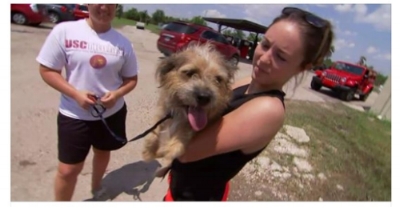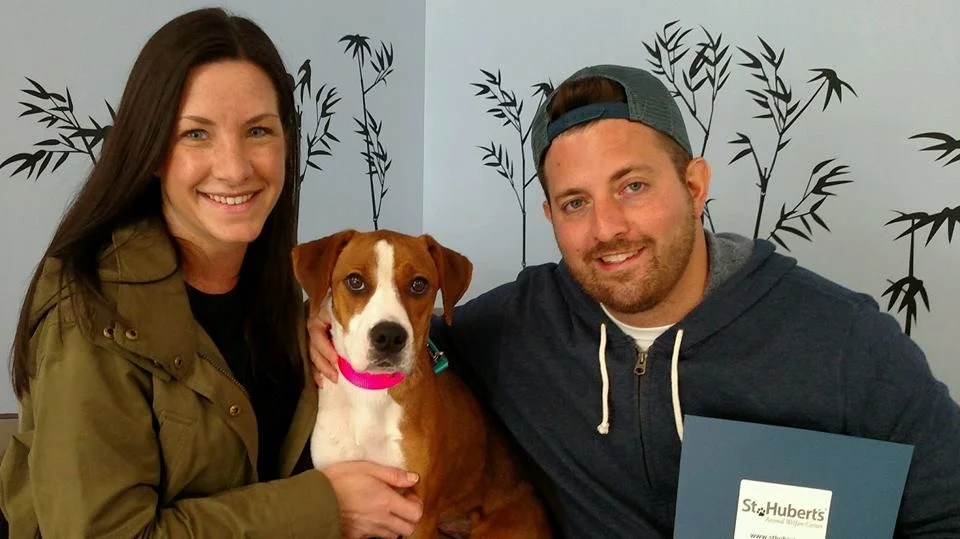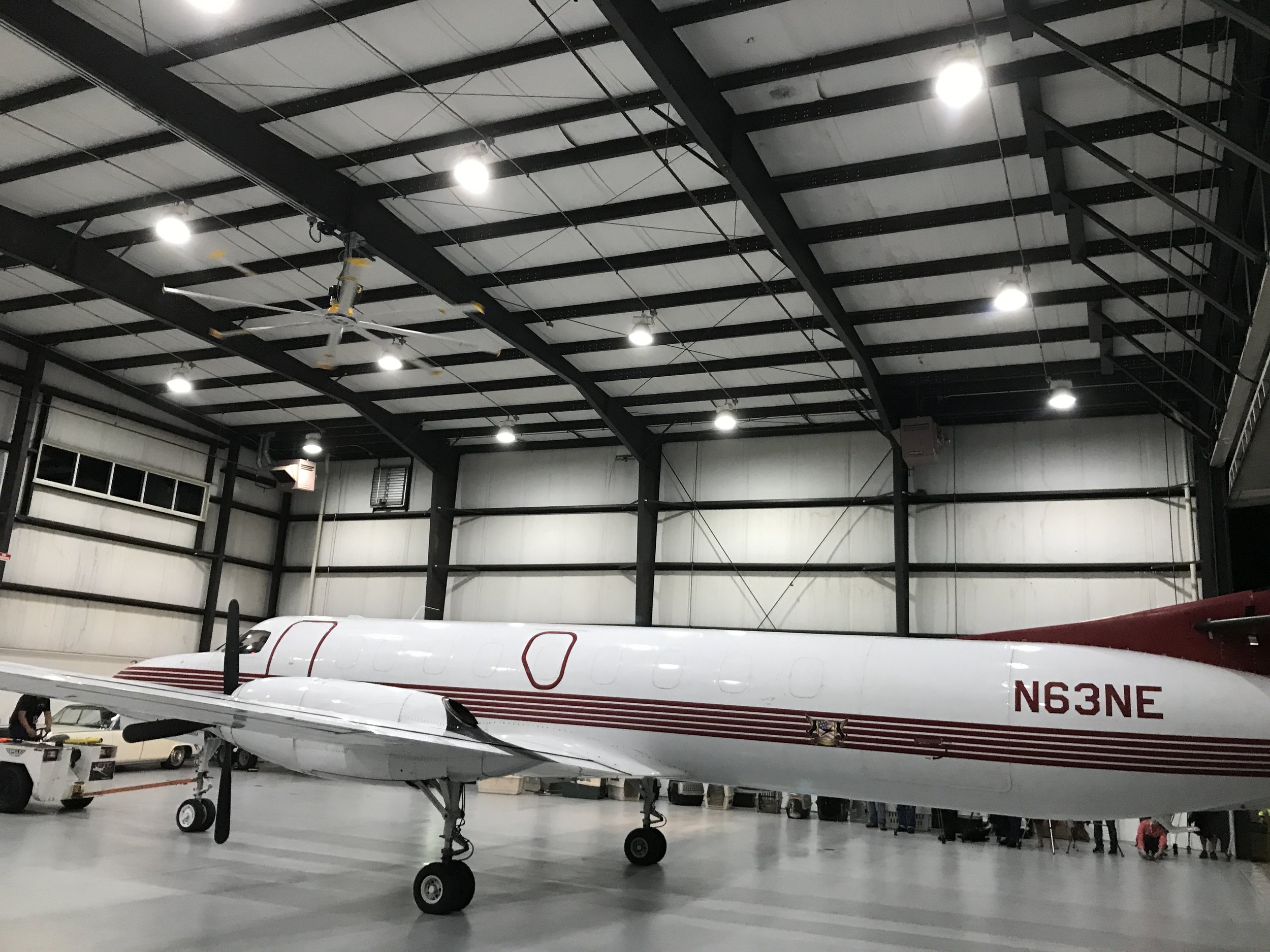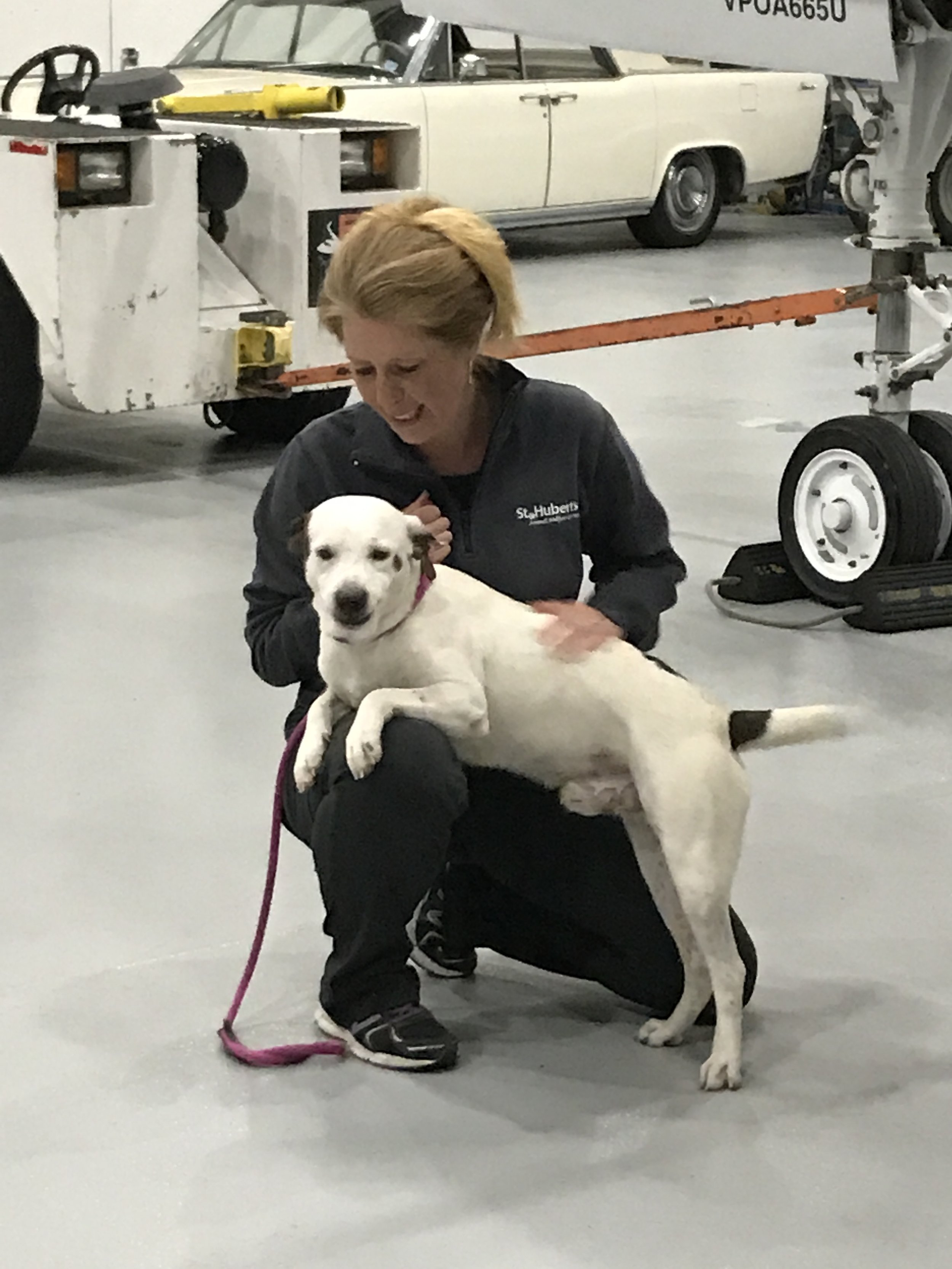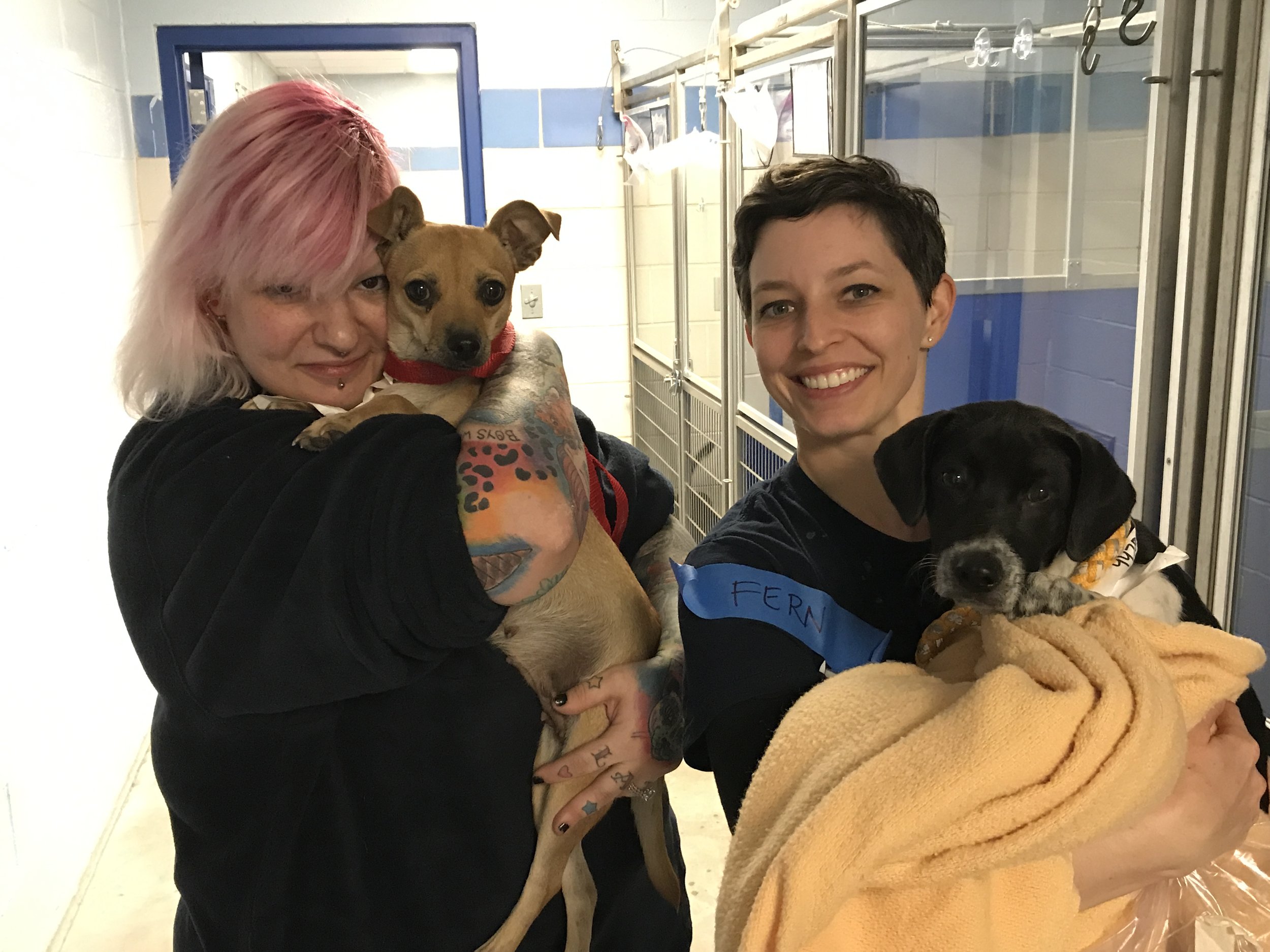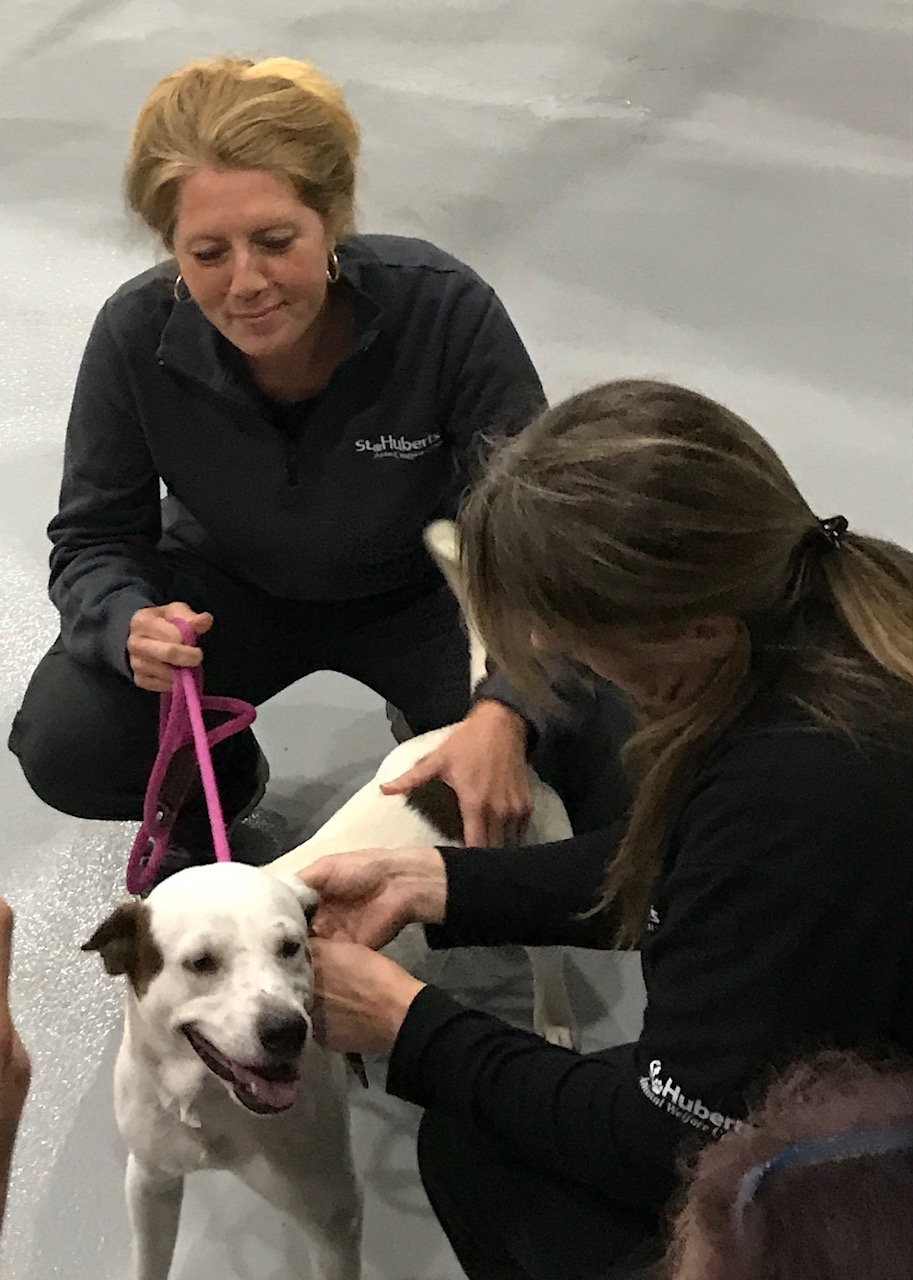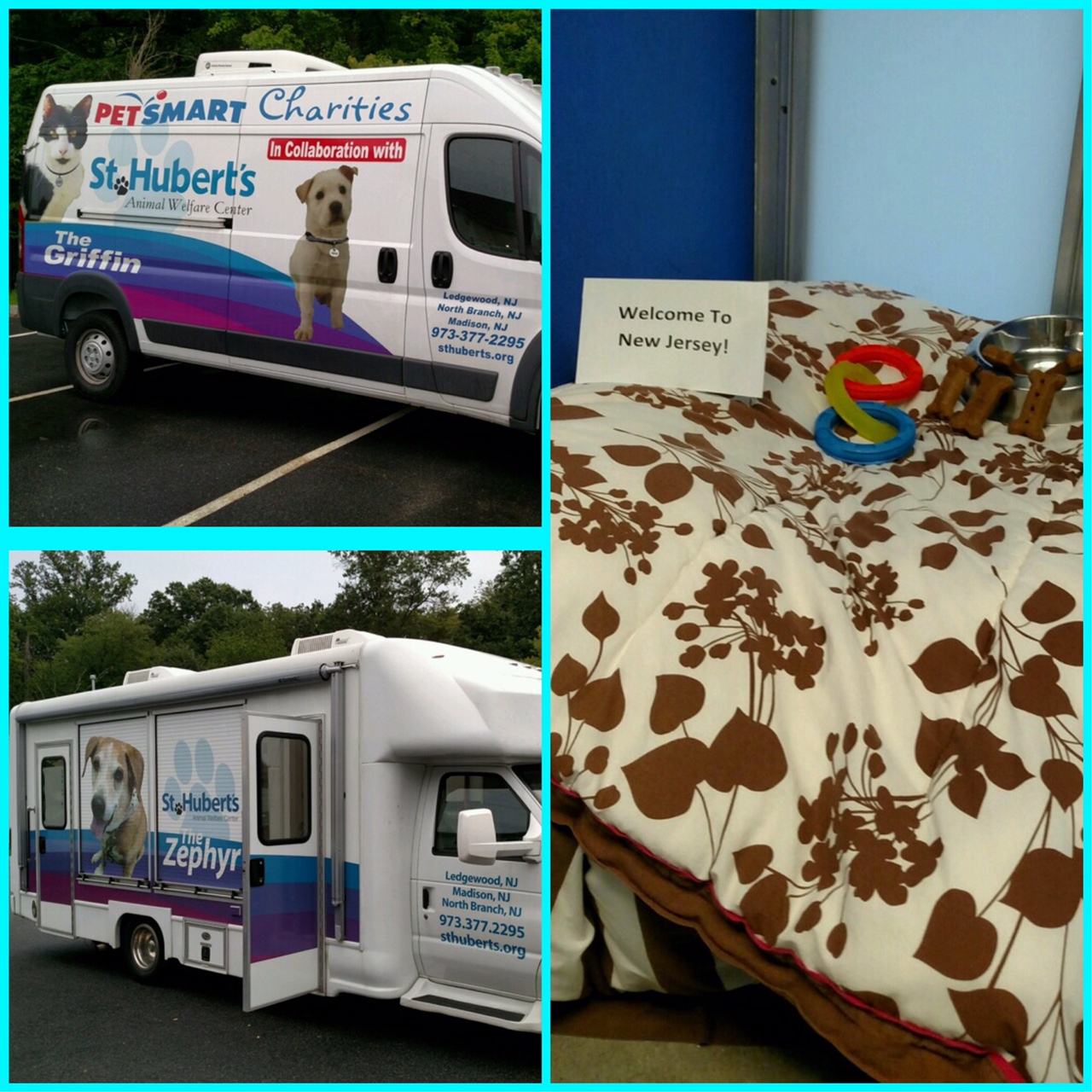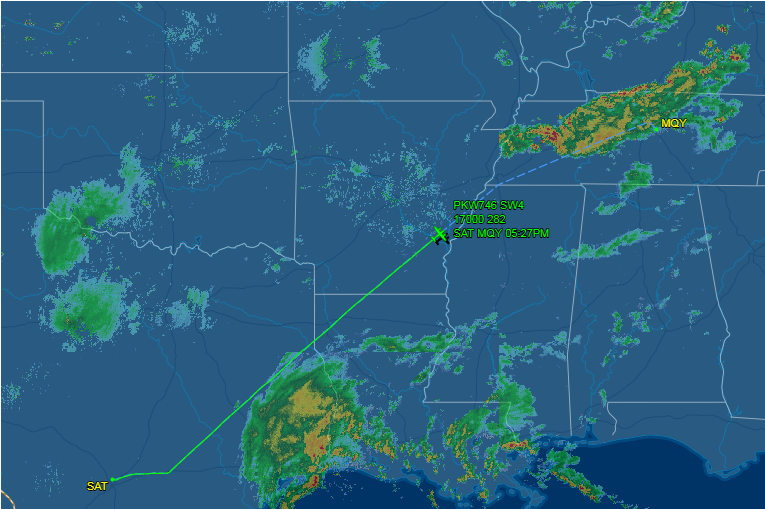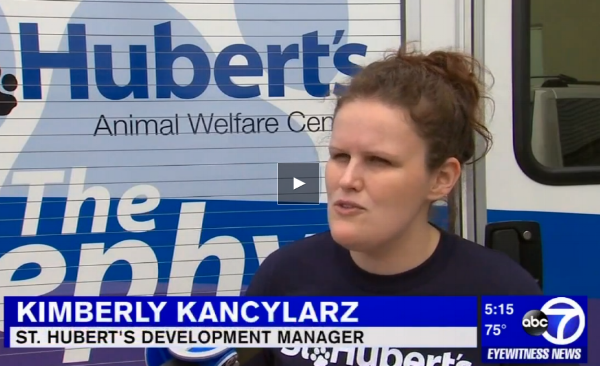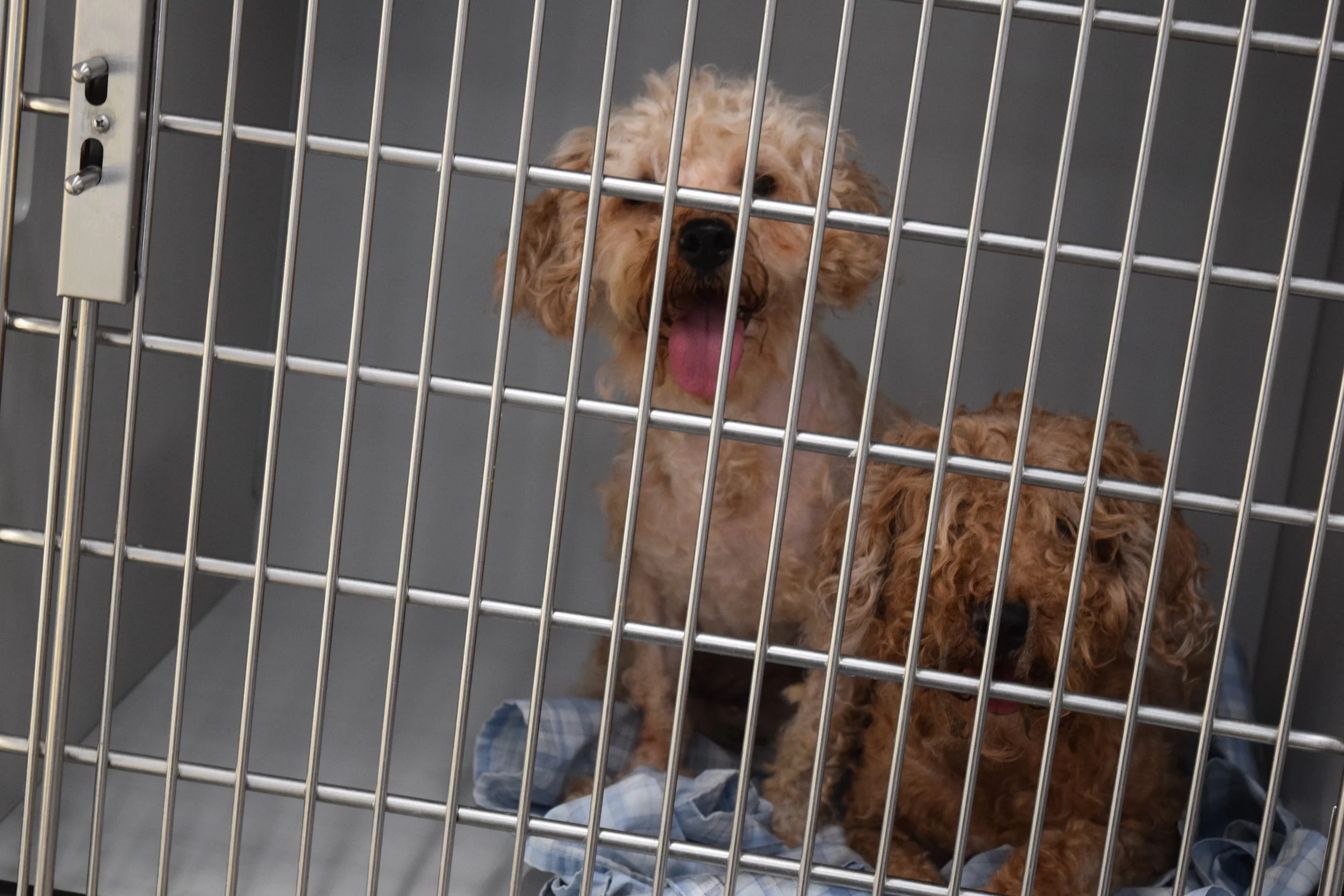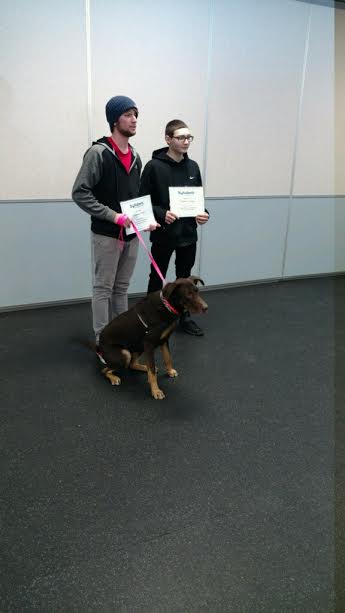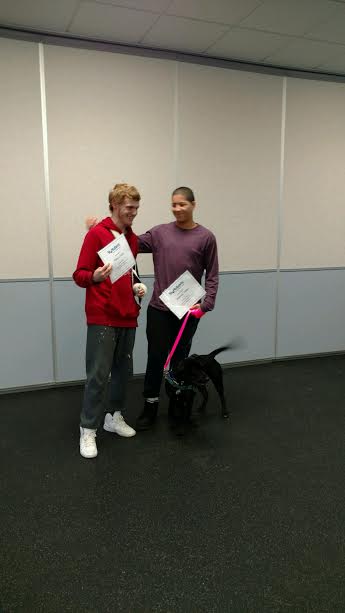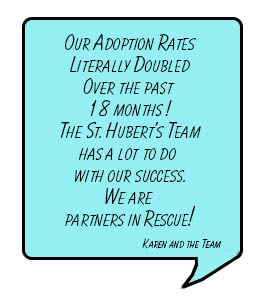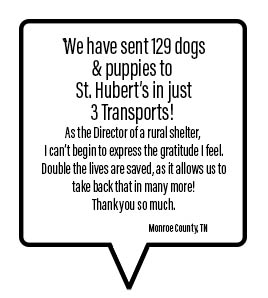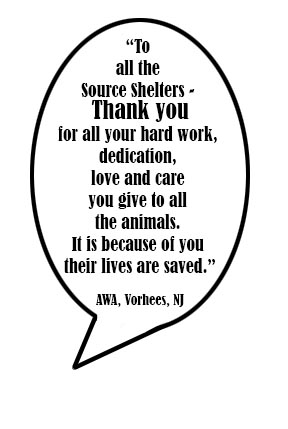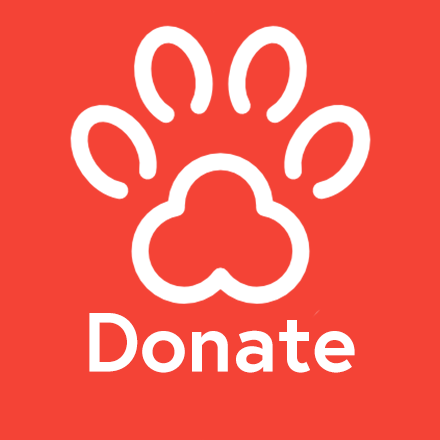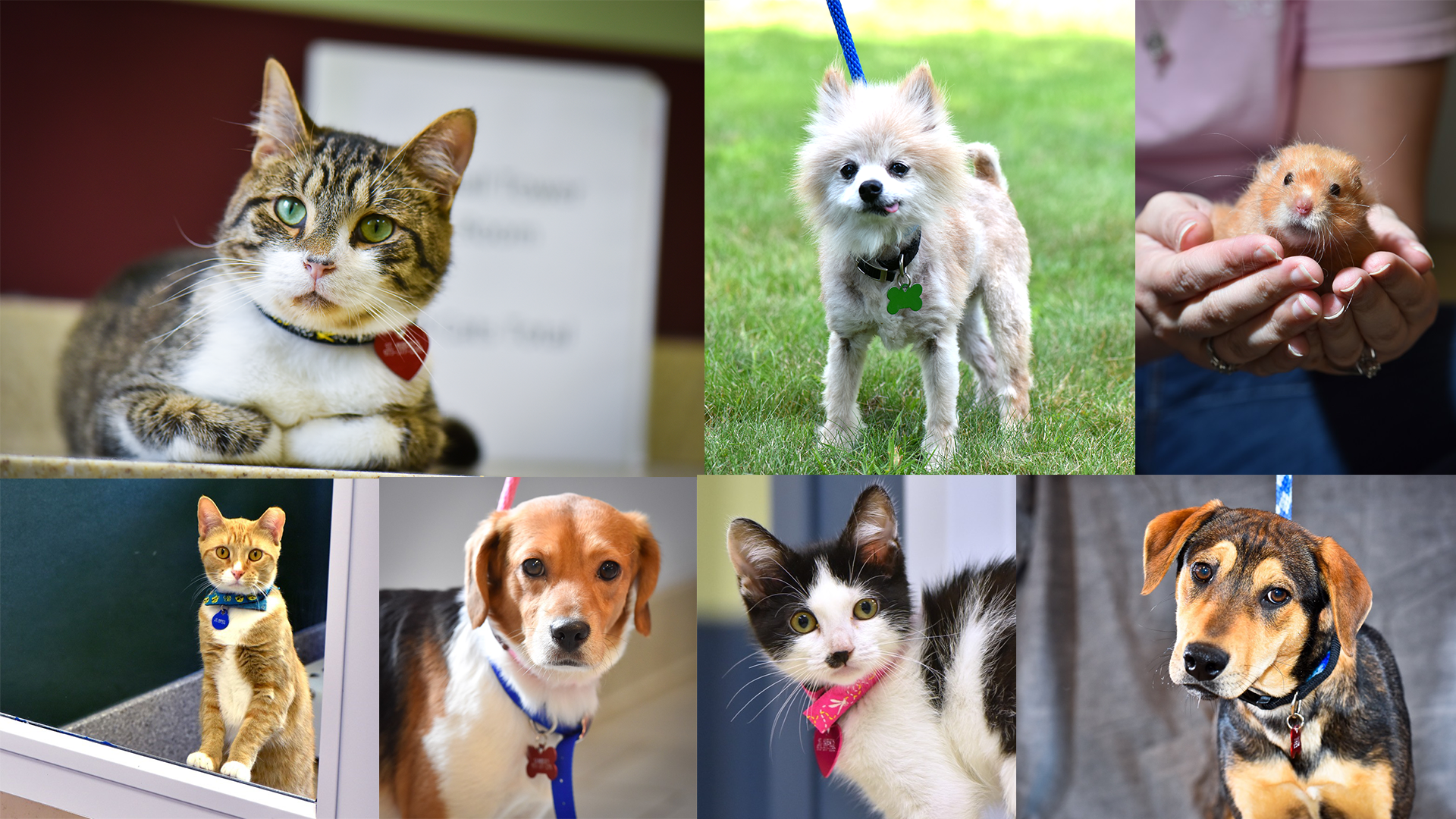
LATEST NEWS
Northeast Shelters Mobilize To Help Areas Impacted by Hurricanes Harvey and Irma
(Updates below shelter listing)
Many thaNks to the following oRgAnizations who are HELPING US WITH LOCAL TRANSPORTS OR welcoming ANIMALS INTO THEIR SHELTERS:
Animal Alliance in Lambertville, NJ
Animal Lifeline in Warrington, PA
Animal Welfare Association in Voorhees, NJ
Burlington County Animal Shelter in Westampton, NJ
Camden County Animal Shelter in Sewell, NJ
Dakin Humane Society in Springfield, MA
Father John’s Animal House in Lafayette, NJ
Gloucester County Animal Shelter in Clayton, NJ
Humane Society of Atlantic County, Atlantic City, NJ
Jersey Shore Animal Center in Brick, NJ
Monmouth County SPCA in Eatontown, NJ
Mt. Pleasant Animal Shelter in East Hanover, NJ
Monadnock Humane Society, Swanzey, NH
New Hampshire SPCA, Stratham, NH
Somerset Regional Animal Shelter in Bridgewater, NJ
SAVE – A Friend to Homeless Animals in Princeton, NJ
Update: September 10
PAART (Pittsburgh Aviation Animal Rescue Team) arrives on Sept. 9 at St. Hubert's with animals from Charleston Animal Society in SC.
The Humane Society of the United States (HSUS) continues to coordinate flights and ground transports from hurricane areas with their Emergency Placement Partners, like St. Hubert’s, around the country. Yesterday, we received 48 dogs and 75 cats on the Wings of Rescue flight from Tampa coordinated by the HSUS. The cats stayed overnight and are transferring out via our Feline Pipeline program, with many going to New England shelters.
In total, our WayStation program accepted 232 animals this weekend and coordinated all the transfers to our destination partners.
Watch Humane Society of Tampa Bay's Live video of animals boarding the Wing's of Rescue Flight to NJ on September 9:
On Saturday, September 9th, Animal Planet featured individuals and organizations involved in moving animals out of harm's way from shelters located in Texas, South Carolina and Florida. St. Hubert's is highlighted in the piece near the end of the show.
-----------------------------------------------------
September 7 - As we continue to receive dogs and cats from the Houston area affected by Hurricane Harvey, we are now welcoming additional animals through Saturday from shelters affected by the new hurricane aiming for Florida - Irma.
Arriving via a Wings of Rescue airlift tonight, coordinated by the Humane Society of the United States, are 34 dogs and 2 cats to be picked up by several of our WayStation sister shelters.
On Friday morning we’ll be welcoming a regularly scheduled transport from one of our partners. During the time we’re assisting the areas affected by Hurricanes Harvey and Irma, we continue on with all of our regular activities with partners and the community who depends on us for animal rescue and care. No animals in or regularly entering our shelters are being displaced due to our additional emergency response.
Another airlift from Houston will arrive late Friday afternoon. An evacuation scheduled for Friday evening by our WayStation partner, Grand Strand Humane Society in Myrtle Beach, South Carolina, will be bringing us 36 dogs/puppies and 20+ cats to be welcomed by St. Hubert’s and our partners. Our existing feline Feline Pipeline program enables us to welcome the cats to the WayStation and then prepare them to move on to our New England partners where capacity and adoptive homes are available.
On Saturday, 50 small/medium dogs will be coming in from the Charleston Animal Society in South Carolina on a ground transport provided by Pittsburgh Aviation Animal Rescue Team.
We are currently awaiting details on an expected airlift from Tampa on Saturday.
We continue to be grateful for the support and generosity of our members and community. We’ve very quickly become more than well stocked with supplies that will be shared with our partners and encourage those wishing to help to make a gift here or to consider gift cards for specialty items we may discover are needed. Gasoline gift cards to offset expenses for our transport vehicles delivering pets to our partners throughout New England would be helpful as well.
---------------------------------------------
September 5 - With over 1,000,000 people and their pets displaced by Hurricane Harvey, the Houston SPCA continues to send out water rescue teams. They have provided nearly 7,000 pounds of supplies to the ASPCA to help those in the Beaumont/Jefferson County area.
Recently, they also implemented a unique system of helping lost pets reunite with their families. The launch of Operation Reunite with the Texas Veterinary Association, Texas Veterinary Medical Foundation, Finding Rover, Petco Foundation and Adopt-a-Pet.com is an innovative program which helps reunite storm victims with their families through facial recognition technology, provides 45 days of foster care through partnerships with vet hospitals, and peer-to-peer fostering for animals. This is the first time in history that photos of “found” animals arriving at shelters will automatically be loaded into a database which will use facial recognition to continually search for a match.
September 3 - Today, Wyatt went home with his new family - the Chusslers. We are so glad that this shy, lovable canine found his forever home here in New Jersey following his long trip from Texas this past week!
The John family couldn't wait to meet Rosco - the first dog off the plane from Texas who has been photographed by most everyone! This happy, energetic boy is all set for a new life with a great family!
Sweet Tanya left our shelter with the Gellers yesterday. This pretty pooch (below) can now officially call New Jersey her home and enjoy a new life with loving parents!
September 1 - The dogs who arrived at St. Hubert’s on August 29th are settling in. In preparation for adoption, neuter and spays are being performed, behavioral assessments evaluated and any medical issues addressed. The canines transported to Monmouth County SPCA, Father John’s Animal House, Somerset Regional Animal Shelter, Mt. Pleasant Animal Shelter and SPCA serving Erie County are being spayed/neutered and enjoying playtime in the sunshine. We are ready and waiting for the next emergency response call, and very willing to assist.
Today, Dr. Jesse Pazos volunteered in our clinic. Medical evaluations were performed on all of our dogs. Three of our Texas boys were neutered and Tanya was spayed. St. Hubert’s appreciates Dr. Pazos' dedication to our mission. Without her expertise which she has generously donated today, the adoption process would not be moving forward.
Click here to check out what other organizations are doing on the ground in Texas to help animals in need.
Thank you to all those organizations who are actively helping animals displaced by Hurricane Harvey:
City of San Antonio Animal Care Services
Houston SPCA Wildlife Center of Texas
Humane Society of the United States
To the following partners and foundations for their generosity - thank you! You are instrumental in the recovery efforts to save animal's lives.
Texas needs all of our support now!
Our sister shelters who partnered with us on taking in the dogs from Texas are:
· Animal Alliance in Belle Mead, NJ - 1 dog
· Animal Welfare Association in Voorhees, NJ - 8 dogs
· Father John’s Animal House in Lafayette, NJ - 8 dogs
· Monmouth County SPCA in Eatontown, NJ - 9 dogs
· Mt. Pleasant Animal Shelter in East Hanover, NJ - 7 dogs
· Somerset County Animal Shelter in Bridgewater, NJ - 8 dogs
· SPCA Serving Erie County in West Seneca, NY - 2 dogs
August 31- Watch the live video of St. Hubert's staff Tom and Adam as they arrive in The Zephyr with Thursday's transport of dogs transferring to The SPCA serving Eerie County and Toronto Humane Society as part of our efforts in assisting Texas. Thank you to our amazing shelter partners!
August 30- The dogs are settling in and enjoying love from staff and volunteers. Check out NJ.com's live feed from their visit with us this morning. Thank you to all of our supporters who have donated supplies and needed funds to help care for these amazing canines!
August 29, 10:00 pm - The Wings of Rescue flight safely arrives in Morristown. Staff and volunteers were on the ground eagerly waiting to meet the dogs who made the long journey. Our CEO Heather Cammisa greeted the first pup to come off the plane, a sweet hound mix named Rosco. Many thanks to Morristown Airport and our dedicated destination partners who awaited the arrival with us.
August 29, 7:30 pm- The precious cargo have left their refueling station in Tennessee and are in flight towards Morristown. Staff at our Madison Shelter are ready for their arrival- each dog has a fresh bed, water and a treat waiting for them! Our transport vehicles, The Zephyr and The Griffin, are prepped and ready to pick up the dogs for their 9:30-10:00 pm ETA. Four destination shelters will be picking up their dogs directly from the airport and the remaining will come to St. Hubert's in Madison.
August 29, 5:20 pm - Flight Tracking Data tells us that 78 new furry friends from Texas are about one hour from their refueling stop in Tennessee. They will then continue on to Morristown Municipal Airport. St. Hubert's and several of our destination partners will be there to meet them.
August 29- Early afternoon- San Antonio Animal Care Services personnel and HSUS responders get the dogs boarded on the Wings of Rescue flight headed to Morristown.
August 28 - In the wake of Hurricane Harvey, St. Hubert’s Animal Welfare Center mobilized its Sister Shelter WayStation transport program to welcome 78 shelter dogs from Texas to New Jersey on August 29th. The transport to Morristown Municipal Airport is the first animal flight to the Northeast from the area devastated by Hurricane Harvey.
“In cases like this, moving pets who were already in the shelter system helps provide capacity for animals displaced by the storm and keeps them close to home,” said Heather Cammisa, President and CEO of St. Hubert’s who founded the WayStation program. “Our hearts are with the people and animals of Texas, and we and our partners will continue to help in the days, weeks and months to come.”
The airlift of dogs by Wings of Rescue from San Antonio Animal Care and Control was organized by the Humane Society of the United States (HSUS). St. Hubert’s will intake the canines to its Madison campus. Following a respite for meals and exercise, many of the dogs will transfer to partners along the northeast corridor.
“HSUS is working to help the people and pets devastated by Hurricane Harvey. We could not do this life-saving work without our placement partners and our rescue partners on the ground, “ said Kim Alboum, Shelter Outreach and Policy Engagement Director for HSUS. “These pets are incredibly lucky to get a second chance through St. Hubert’s and their WayStation partners.”
Special Thanks to:
The WayStation program is a coordination of 58 animal welfare organizations in the eastern U.S. to optimize capacity to address canine population disparity across regions and lend a hands-up to source communities. In the past year, the program has helped nearly 4,000 canines and provided more than $90,000 in funding for low-cost spay/neuter to the public in southern communities.
Transporting to the Future
Connecting places of opportunity with areas of need
By: Heather Cammisa, CAWA
President & CEO
“Is it true y’all don’t have puppies in the North?”
Ten years ago, in a small, tidy shelter in one of the poorest areas of Mississippi, that was one of the first questions I heard. I was in Mississippi working on a project to assess the severity of the overpopulation issue, helping develop effective spay/neuter messaging and provide hands-up help in training, networking and some funds working on a project launched in the wake of Hurricane Katrina.
The shelter manager and the board president were both curious about the puppy question. I told them my take as a former shelter director from up North—that we do still have puppies, but that we’ve made great strides and have the capacity to help with dogs. I described what we felt had driven the progress in the Northeast—accessible spay/neuter efforts, effective animal control laws, a built-up humane infrastructure and more—and I found myself looking at two women with tears in their eyes. They couldn’t imagine a world without run after run of beautiful puppies, more than could ever be saved.
The Mississippi shelter had gotten offers of help from a group up North, but “we thought it was laboratories trying to get our animals,” the board president confessed.
Quantitative studies told the story: the deep South had more households with dogs, more dogs per household and far lower spay/neuter rates than the country overall and the Northeast in particular. Their laws weren’t as progressive, they didn’t have a statewide animal control association, there was a dearth of infrastructure in the region (one shelter might be the only shelter for hours in any direction), and regional climate and poverty were working against them. But hope filled their eyes when they heard that success was possible and space-based euthanasia was vanishing in regions where it was once the norm. I was privileged to share that message with more than four dozen shelters I visited in the deep South.
Fast forward 6 years. I’d become President /CEO at St. Hubert’s Animal Welfare Center in New Jersey and we were a couple years into our “Sister Shelter” transport program that provides a hands-up to source shelters—specifically, for each dog we took in from our partner groups, we donated $50 back from the adoption fee to fund low-cost spay/neuter for their public. We provided educational opportunities, enrichment kits, onsite visits to share our behavior modification techniques and more.
Attending an HSUS Companion Animal Advisory Council meeting in early 2015. I was the only Mid-Atlantic representative and was invited to sit with another regional group. I sat down with the New England reps and asked them about a crazy rumor I’d heard—that they’d reached the point where they were transporting in cats. It was my version of “Y’all don’t have kittens in the North?” It was true. They explained that they had seen the tipping point coming, but even they were surprised how quickly it did.
Thus began St. Hubert’s Feline Pipeline program. We increased the number of cats we picked up from all over New Jersey, prepped them and got them up to our New England friends. We’d become both a receiving state for dogs and a sending state for cats, giving us great insight and opportunity to see what was going on up and down the East Coast.
We should be celebrating this momentum of change and how far we’ve come. In the 1970s, the United States euthanized an estimated 100 dogs and cats per thousand humans—one dog or cat for every ten people. Today, based on most recent estimates from the ASPCA that figure is 5 dogs and cats per human thousand. From 100 to five. Even if you double the ASPCA’s estimate—and no group thinks it’s still that high—it’d still be one tenth of the euthanasia we were once performing.
We don’t talk about this enough, but it’s a new day. It’s time we focus on connecting the places of opportunity with the areas of need. It’s time to really put our collective shoulder behind ending the euthanasia of our healthy and treatable companion animals, mobilizing our movement via productive relationships and engaging in dialogue about what we can do TOGETHER to secure the win, putting in backstops (such as laws against puppy mills.)
The simple fact is the national groups can’t be everywhere. It’s up to us to help each other. One of the biggest obstacles to our own success is how unconnected we are with one another.
Starting with self-assessment, here’s what we’re doing at St. Hubert’s. In 2016, five years into our Sister Shelter program, we created an official Sister Shelter WayStation thanks to PetSmart Charities. As a former economist, it pained me to see shelters driving up and down the east coast for small numbers of dogs, knowing that with coordination on both ends, a single transport could move as many dogs much more efficiently. Airlines and big corporations all use similar hub models. So, we created one. We believe we’ve built something replicable that, if adopted in targeted areas, could cast a net over the nation as a whole.
In our first 11 months, our network grew to 31 source shelters, 27 destination shelters (us included) and transported more than 3,700 canines, provided $90,000 back to source communities for low-cost or free public spay/neuter, provided scholarships to five source shelters to Animal Care Expo 2017 and provided onsite training and enrichment supplies in four states. We’ve sponsored volunteer software for one agency, donated banks of caging in Kentucky to enable indoor housing for puppies and sent food, litter and supplies to many organizations. The program helps older dogs, animals with special needs and larger dogs as standard operating procedure, not just puppies.
Nothing illustrates the bigger picture impact than the organizations on both sides. Dr. Kim Sanders of Anderson PAWS in Anderson, South Carolina, used give-back funds to create a “Spay or Pay” program for stray reclaims—they waive all fees of reclaim if the owners allow their pets to be altered, at no charge. They also provide free spay as a surrender prevention tool. At Humphreys County Humane Society in Waverly, Tennesse, their special program alters pit bull types, using a lottery system. Humphreys County Humane Society president Ann Hunter wrote, “This program has allowed us to reach people that would not normally come to us for help … Thanks is just not enough for how you have helped us help the animals.” They included photos of some of the dogs and their people who utilized the spay/neuter program.
Some of the source shelters now act as secondary hubs, reaching out within their areas. That is absolutely a goal of the program.
Annie Guion, executive director at Windham County Humane Society in Vermont, describes how the network helps keep our community connected with one another and reminded of the growing divide in experiences, writing, “[The source shelters] are dealing with a situation that would crush a lot of us … Thank you for sharing the humanity of these amazing people … It is such a good reality check for us spoiled northerners.”
We treasure our source shelters. They help us as much as we help them. They trust us with their “babies” and with their staff, volunteers and community. They enable us to make an even bigger impact in mission, now and into the future.
Together we can expand our dialogues to include discussion about enacting needed laws, speaking up for wildlife, farm animals and against things like the circus coming to town. We can brainstorm about things like building public support for those 20-24 million much-loved pets that live in poverty and whether spay/neuter should be more targeted in order to put resources to optimal use. We can navigate issues of sustainability like the potential for effective mergers in our field, whether big new buildings are needed and how expanded community outreach efforts can be funded. There’s much we still need to work on together and the more mobilized we are, the better we’ll do it. We need to look to our roots of animal protection and prevention of cruelty, beyond companion animal adoption and response.
Transport alone is not how we’ll cross the finish line. It is a powerful catalyst for getting there faster if hands-up is considered obligate. Is there a better opportunity to deepen the ties with one another to respond to evolving opportunities and challenges in our cause than these types of networks? I can’t think of one.
Responses from
Animal Welfare Professionals...
“Nailed it, Heather Cammisa. Transport is only a bandaid if source shelters don’t address the root cause of the obstacles that lead to the need - like lack of affordable s/n and pet retention programs. Destination shelters are at our best when we lend our expertise and funds to support the source organizations in their efforts to eliminate the need for transport by implementing programs mentioned in this blog. Heather, MHHS hears you and we’ll immediately step-up our efforts to provide a hand-up to all the transport partners we work with.”
“Programs like this saved PAAS. We were designed as an adoption shelter in a rural, economically deprived area. Without transport, spay/neuter grants and HSUS Pets for Life we would be closed. Instead we’ve transferred 2,000 dogs to Dumb Friends League, received spay/neuter grants and changing the culture for pet ownership with pets for life. I’m a believer.”
“Brilliantly stated! from time to time our local NJ shelter has worked with St. Hubert’s taken in some of the Way Station animals and they are highly adoptable, wonderful animals that could have lost their lives were it not for this innovative program. Kudos to Heather and her team for making this successful program work so well for both sending and receiving shelters and most importantly, for the animals saved!”
“Having lived in the north for most of my life, I know the benefits of spay/neuter. Relocation to a state without strong animal care laws has been a real challenge. I help run a rural volunteer animal shelter. We could not have made it without the WayStation program and similar transport programs. Education is sorely needed in this area to stem the tide of animal births. Many people just don’t see the need for spaying or neutering their pets. The funds sent back to source shelters by St. Hubert’s are helping to stem the tide. I cannot say enough good things about St. Hubert’s for their WayStation program and PetSmart Charities for their grants to continue providing care to the many unwanted animals in this area.”
“Equal collaboration, transparency, practical altruism and connection with a macro-level understanding of welfare and protection appear to guide the beginning development of what, as the representative of a source region and shelter, I hope will become the norm in transport practice. Thank you for this contribution.”
“So true. In the North we have indeed largely solved, at least in the short term, canine over population and now see the result of similar spay/neuter efforts rippling in the feline community. I’ve long said “why shouldn’t those creatures travel North to communities that want to adopt them. It’s simply an accident of birth that a puppy arrived in the Deep South still coping with high euthanasia. But, were we really helping? Points to ponder at 2 a.m! Now as a newly active partner of the Waystation Programme knowing funds are being channeled back to those shelters and communities that surely need the help is the smart solution. Many hands-up will ultimately bring our partners south of the Mason-Dixon line to a place where they are not forced to operate as we used to in the 1970’s and 1980’s.”
“As the rescue coordinator for a source shelter, I can not express how big an impact the WayStation transport program has had on our small, rural shelter.
The funding, from our transport animals, is helping us realize our goal of 600 low cost spay/neuters. Our transports are always full. Our community is enthusiastic to take advantage of a cost effective way to alter their pets, if it is available to them.
The consistent transporting of the overflow of dogs out of our shelter has dramatically increased our live release percentage. We hope to continue to be able to participate in this program, and to help educate our community, to make the lives of our companion animals better.”
“As the director of a rural shelter, I can’t be more grateful for the 750 lives saved this year already through our partnerships with transports, including St. Hubert’s. In reality, that number is actually doubled, since every life saved on transport allows another one to be saved at the shelter. We have seen intake numbers decrease through our S.N.A.P. (Spay Neuter Assistance Program), but there is still a long road ahead of us. Working together is the only way to go!”
“Well said! I love being part of a shelter that also partakes in being part of the solution. Only in working together can we continue to do great things!”
“Loved this article and have shared around. Light at the end of the tunnel, not there yet but things are improving. I am volunteer cat trapper in New Orleans and our little group traps 25 cats a week and the Louisiana SPCA spays and neuters them. We ask people to pay something if they can. Many don’t pay a dime but shelter intake and EU is dropping. Lots of ear tipped cats out there but plenty more to go. Transport, spay neuter and education along with massive free or low cost spay neuter the answer to this nightmare. Very nice article...”
St. Hubert's Welcomes 25 Neglected Poodles
UPDATE July 7
Our amazing friend Dr. Elia of The Animal Hospital of Roxbury and her vet tech Josie reorganized their schedules to come and assist our clinic team with examinations. Rock Stars!
Shampooches Pet Spa Mobile Grooming's Wallace and Erica rolled in first thing in the morning to provide grooming and
“sham-poodle-ing.”
The transition to the new lives they deserve is well underway for our sweet little poodles! Yesterday all of them were vaccinated and received preliminary exams, difficult at best due to the extreme matting, on intake.
All day Friday has been devoted to the arduous task of removing the years of neglect that resulted in coats deeply matted and soaked to the skin with feces and urine. One of the professional groomers assisting us said “I’ve NEVER seen anything like this—and I’ve seen a lot. It had to take YEARS for the condition to reach the point it has on some of these dogs.” Once they’re shaved down and bathed it’s easy to see how much better they feel, able to walk and extend their legs without the discomfort caused by the weight of the mats pulling against their skin. It’s been a long time too since most of them actually felt dry. More complete exams reveal that the majority of the dogs are middle aged and have severe tartar buildup that will necessitate dental scaling and polishing, some with extractions. Several will require treatment for ear infections and urine burns on their skin.
VP of Direct Animal Care and Life-Saving Partnerships Becky Burton took time to give each one a hug and complement the great new look.
Through it all this resilient group has remained patient and cooperative. They really enjoy the handling, special attention and companionship of the people helping them. We hope that they will begin to become available for meet and greet visits with potential adopters early next week and be able to head out to loving homes as soon as they’ve been spayed/neutered.
We’re so grateful to those who are donating to help us ensure that every little poodle will get everything he or she needs to be ready to enjoy a happy, healthy life. Our clinic and animal care teams are working tirelessly and we owe very special thanks to the compassionate and skilled professionals who took time out from their busy schedules to come in and donate their services to this special group.
Some got their makeovers courtesy of groomer Renee Haak!
Looking Good!!
Watch the ABC 7 News Coverage Here!
St. Hubert’s Animal Welfare Center has just welcomed 25 Poodles of various ages from dire straits in Hudson County and urgently needs donations to assist with their care and treatment. The dogs were discovered during an unrelated municipal inspection. The house where they were living was subsequently condemned. They were removed by Animal Control Officers from New Jersey Humane Society in West New York and transported to Summit Animal Clinic in Union City Wednesday night. Several of them were so severely matted that their coats were immediately shaved down to alleviate their discomfort.
After having obtained surrender of the dogs to NJHS, ACOs Geoff Santini and Fernando Rosario reached out to St. Hubert’s to request assistance in providing care and eventual adoption for the group. Within the hour staff had prepared the Center’s 26-foot transport vehicle, The Zephyr, and were enroute to pick up the entire group and bring them to the Madison shelter, where onsite staff were preparing for their arrival.
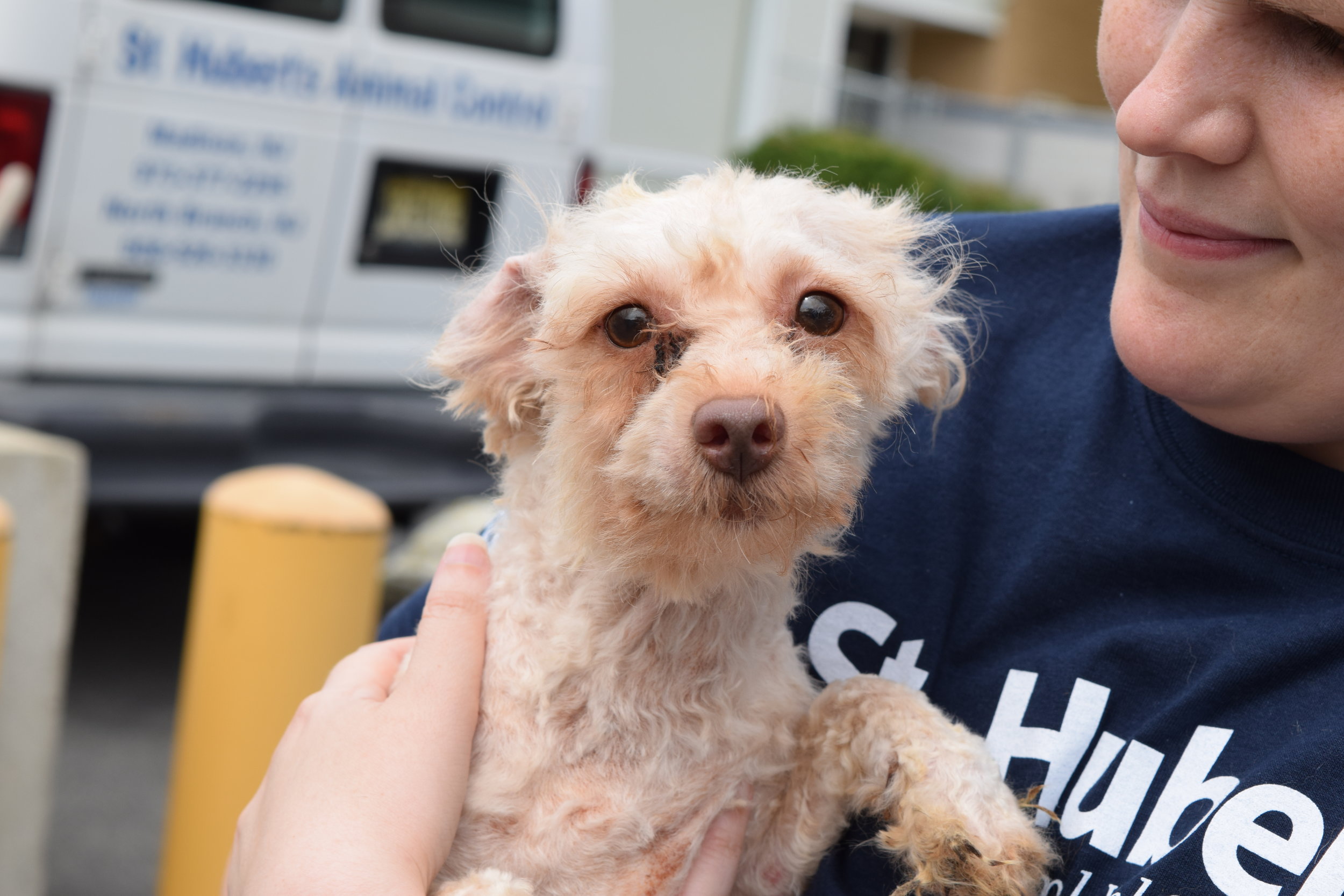
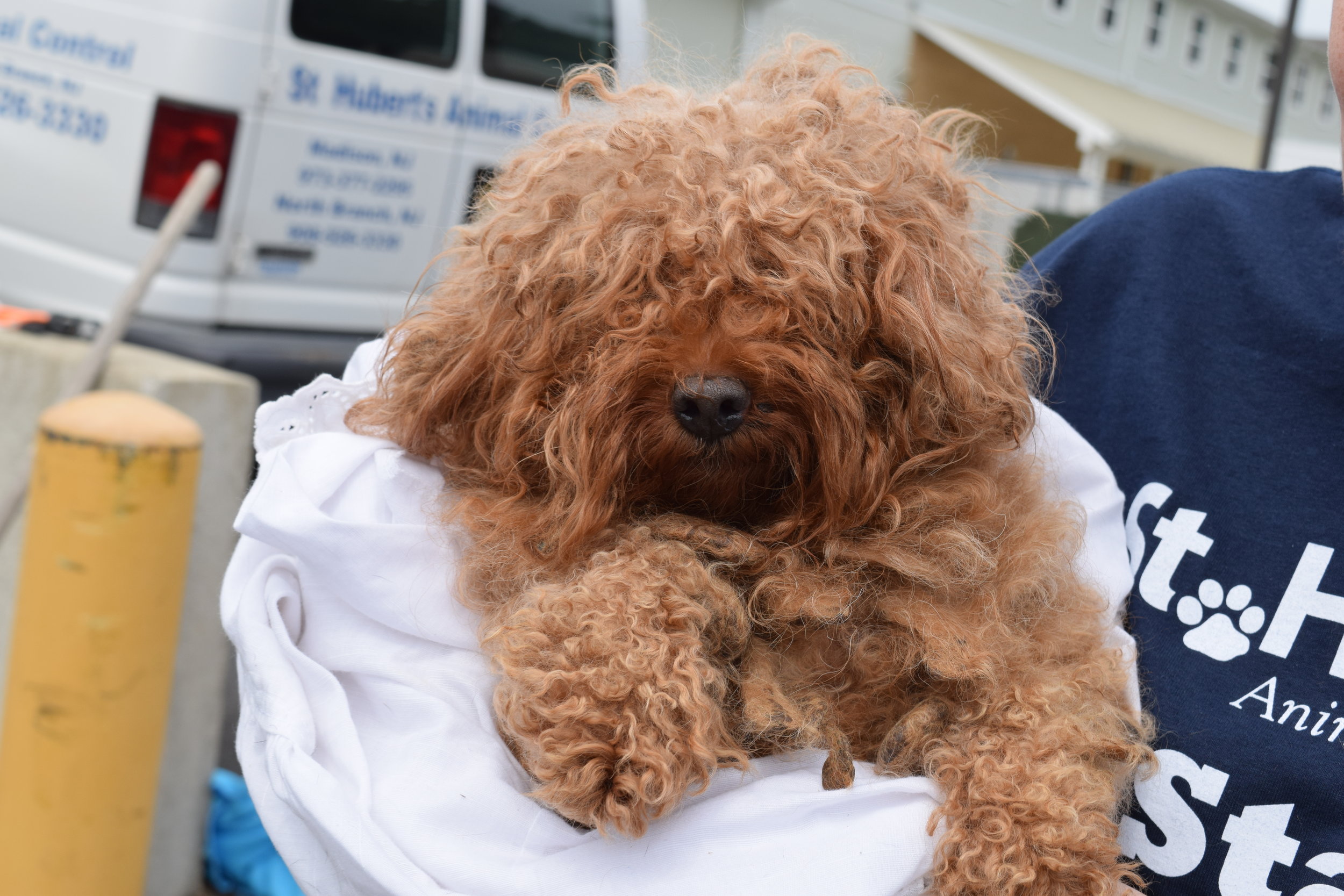
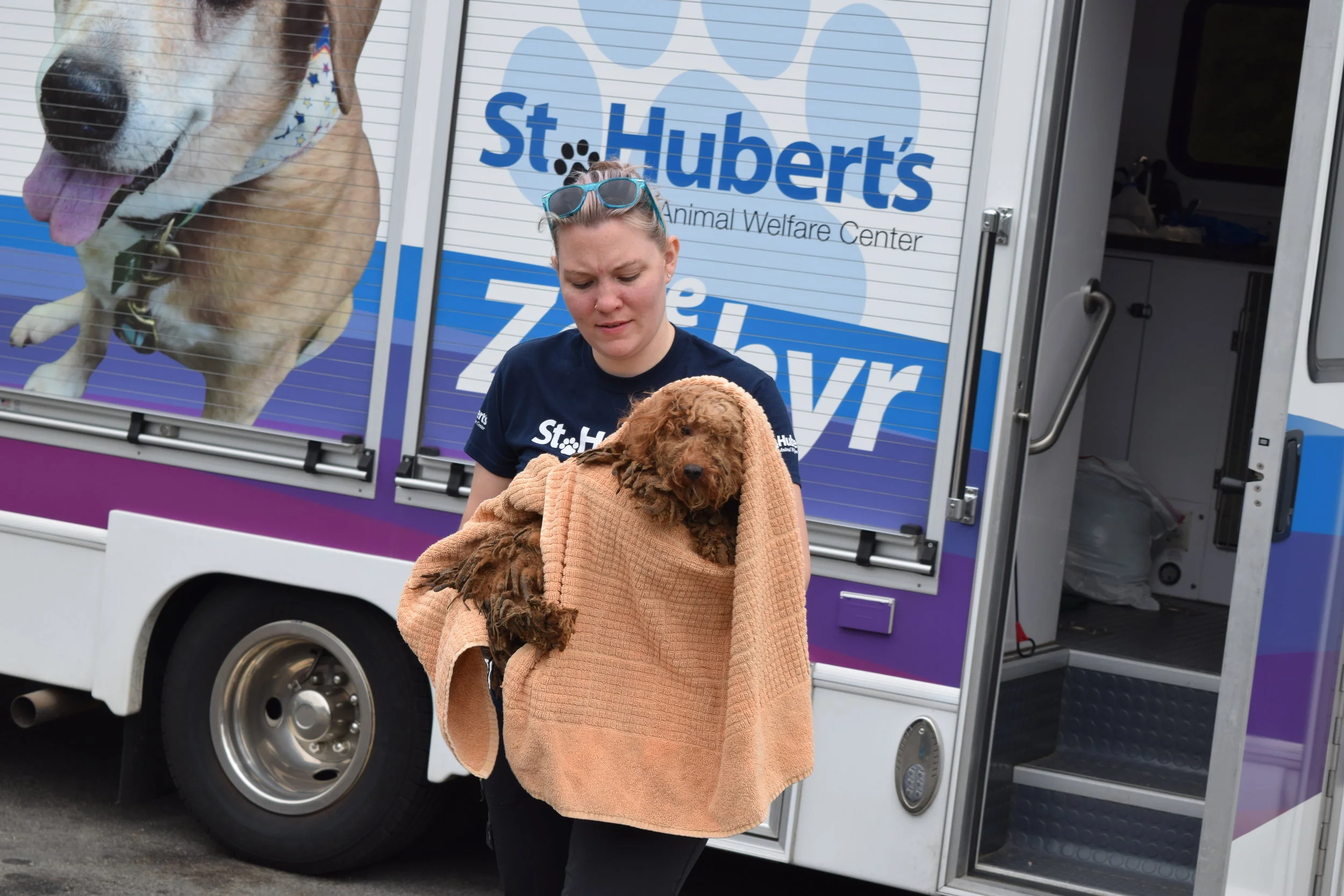
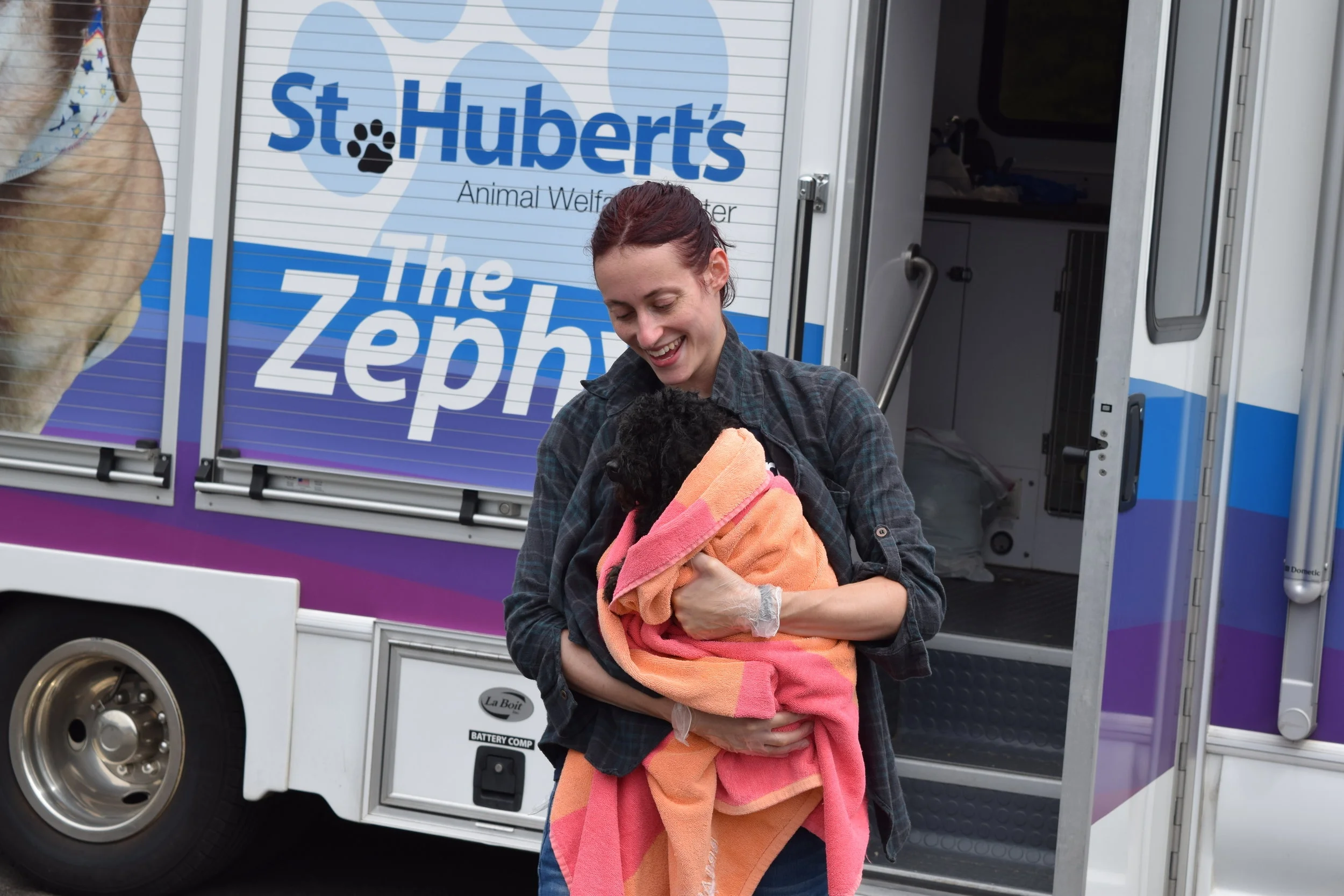
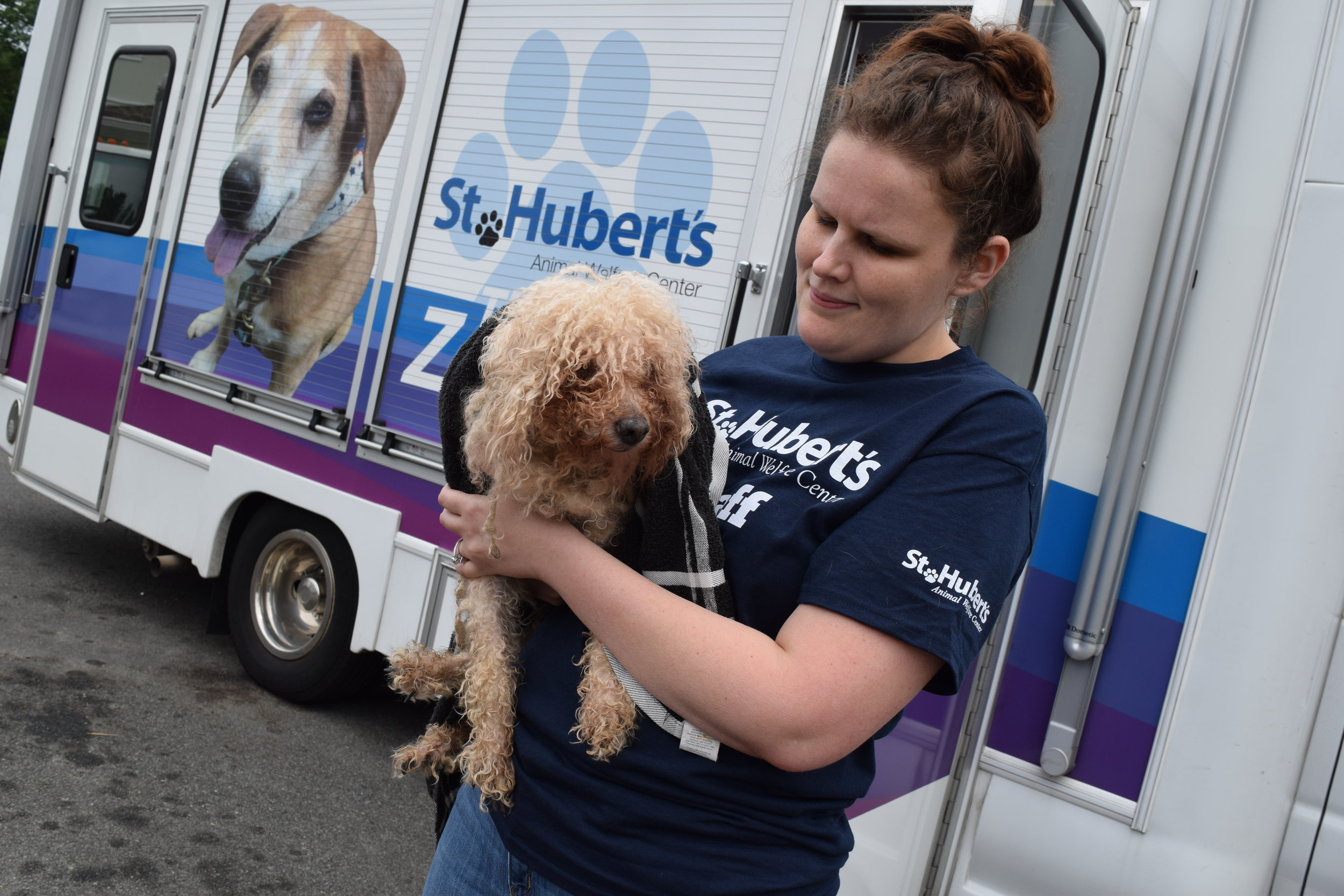
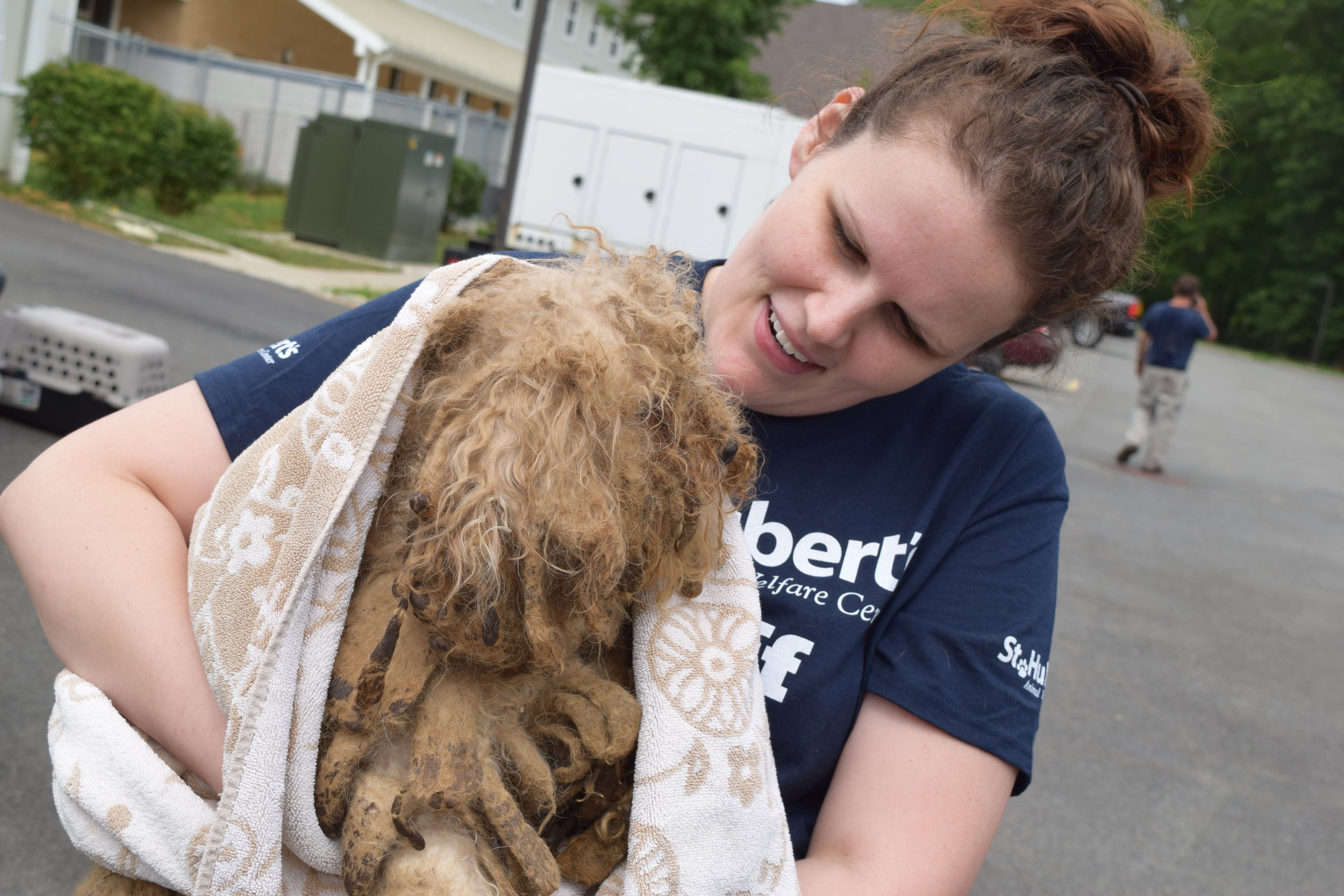
“The willingness of organizations to work together is key to being able to manage cases of this size, and St. Hubert’s agreed to accept all of the dogs unconditionally,” said Heather Cammisa, CEO and President of St. Hubert’s. “Once they’ve all been thoroughly examined by our veterinarian and clinic staff, we will set to work making sure each one gets whatever special treatment is needed.”
This case comes on the heels of a similar case in Cumberland County a week ago. The Cumberland County SPCA removed 25 dogs from substandard care and housing and St. Hubert’s, which has a longstanding Sister Shelter partnership with CCSPCA, still has 13 of the canine victims of that situation in its care and custody as well.
“As these cases unfolded right on top of each other our greatest need right now is monetary donations to support them as we treat and prepare them for placement,” said Cammisa. “Our staff will willingly step up and go the extra mile for this large group of newcomers no matter what they need, and we ask for the community’s generosity to help us with the associated costs.”
Special donations to support the care and treatment for the animals can be made on-line by scrolling to the bottom of this news article, via telephone at 973-377-7094, by mail at P.O. Box 159, Madison, NJ 07940 or in person at any of St. Hubert’s shelters. The organization’s Matching Gift Challenge is in effect until July 31—all contributions will be matched by an anonymous donor up to $85,000.
ASPCA Behavioral Rehabilitation Center Announces Permanent Relocation; Celebrates Final Group of Canine “Graduates” at St. Hubert's Animal Welfare Center
Madison, N.J.—As the ASPCA® (American Society for the Prevention of Cruelty to Animals®) approaches the four-year anniversary of its Behavioral Rehabilitation Center pilot program, staff members prepare seven dogs – the last group of canine “graduates” – who have successfully completed the rehabilitation program for adoption with rescue groups and shelters in New Jersey and New York. Based at St. Hubert’s Animal Welfare Center in Madison, N.J., the ASPCA Behavioral Rehabilitation Center is the first-ever facility dedicated strictly to providing behavioral rehabilitation to canine victims of cruelty and neglect—including those rescued from puppy mills, hoarding situations and dog fighting rings—who suffer from severe fear and anxiety that prevented their adoption. The ASPCA will be relocating and expanding its behavior rehabilitation program to a permanent facility in Weaverville, N.C.—scheduled to open later this year—where it will provide research-based training for shelters around the country and a greater capacity and more resources to help traumatized dogs.
The ASPCA launched the Center as a pilot program in March 2013 and has since helped hundreds of homeless dogs suffering from debilitating behavior issues. Sheltering professionals from 20 states were also invited to visit the facility to observe behavior rehabilitation techniques and apply key learnings to help homeless dogs in their own communities.
“Through this unique program, the ASPCA has gained a tremendous amount of insight into behavioral rehabilitation, and provided second chances for dogs who might otherwise be euthanized for behavior issues,” said ASPCA president and CEO Matt Bershadker. “We thank St. Hubert’s for being an invaluable partner in making our pilot program possible, and finding safe and loving homes for at-risk dogs who graduated our rehabilitation program. We’re thrilled to build a permanent facility where we can put countless more fearful, at-risk dogs on the path to recovery and adoptability.”
"It has been our privilege to work with the ASPCA and these deserving animals over the past four years," said Heather Cammisa, president and CEO of St. Hubert’s Animal Welfare Center. “We know firsthand the hard work and heart that went into the successful development of new tools and methods to help animals and shelter and rescue colleagues far and wide. It has been a beautiful, productive relationship and we will miss our ASPCA family in the building while continuing to work together in other capacities to help animals and communities. On behalf of St. Hubert’s, we thank the ASPCA for paving the way for canine behavior rehabilitation and providing exceptional educational resources to the field."
At the Center, a dedicated team of animal behavior experts and support staff work daily with these dogs by implementing scientifically sound techniques to reduce their fear of people, as well as to gradually acclimate them to unfamiliar objects, sounds, living areas, and real-life situations that can induce trauma and severe stress. ASPCA behavior experts have been conducting a research study that they intend to share with shelters and rescue groups around the country so that these groups will be better equipped to rehabilitate homeless dogs from similar backgrounds and save more lives. The program is showcased in an award-winning ASPCA documentary, “Second Chance Dogs,” which is currently available on Netflix.
“The progress we’ve made since the opening of the center nearly four years ago is remarkable,” said Kristen Collins, senior director of ASPCA Anti-Cruelty Behavior Rehabilitation. “We’re proud of what we’ve accomplished so far, and look forward to continuing and advancing the work at our new permanent facility, which will have greater capacity to train visiting professionals as well as rehabilitate animals.”
Rescue groups and shelters, including the ASPCA Adoption Center, who assisted in finding homes for dogs that completed the Behavioral Rehabilitation Center program include: Alaskan Malamute Rescue of Delaware; Animal Alliance; Animal Rescue League of New Hampshire; Big East Akita Rescue; Bucks County SPCA; Chautauqua Humane Society; Chow Rescue Ontario; SPCA Serving Erie County; Eskies Online; Hartman's Haven Rescue; Humane Rescue Alliance; Humane Society of Calvert County; Humane Society of Port Jervis; Mohawk Hudson Humane Society; Monmouth County SPCA; Mt. Pleasant Animal Shelter; Rescuzilla; Sammy's Hope; Sean Casey Animal Rescue; Second Chance Pet Adoption League; Shiba Rescue GTA; and St. Hubert's Animal Welfare Center.
For more information on the ASPCA Behavioral Rehabilitation Center and stories of individual dogs who have successfully graduated the program, please visit www.aspca.org/BehavioralRehab
About the ASPCA®
Founded in 1866, the ASPCA® (The American Society for the Prevention of Cruelty to Animals®) is the first animal welfare organization in North America and serves as the nation’s leading voice for animals. More than two million supporters strong, the ASPCA’s mission is to provide effective means for the prevention of cruelty to animals throughout the United States. As a 501(c)(3) not-for-profit corporation, the ASPCA is a national leader in the areas of anti-cruelty, community outreach and animal health services. For more information, please visit www.ASPCA.org, and be sure to follow the ASPCA on Facebook, Twitter, and Pinterest.
About St. Hubert’s Animal Welfare Center
Founded in 1939, St. Hubert’s Animal Welfare Center is a nonprofit organization dedicated to the humane treatment of animals. Its services to the community include pet adoption and animal rescue, humane education, a pet helpline, pet training, professional education, animal-assisted therapy, and pet loss support. St. Hubert’s Animal Welfare Center has shelters in Madison, North Branch, and Ledgewood, NJ, The Behavior Center in Madison, and a PetSmart Charities Everyday Adoption Center at the PetSmart in Mt. Olive. For more information about St. Hubert’s, visit www.sthuberts.org or contact the Madison shelter at (973) 377-2295, the North Branch shelter at (908) 526-3330, the Ledgewood shelter at (973) 347-5469, or the Everyday Adoption Center at (973) 448-7601, ext. 7.
St. Hubert's Animal Welfare Center WayStation Program Featured in Animal Sheltering Magazine
(TRANSPORTING)
ACROSS THE DIVIDE
Karina King, director of operations at the Dakin Humane Society in Massachusetts, has what you might call “a good problem.” In late October 2016, between the nonprofit’s two locations in Springfield and Leverett, she has only one dog available for adoption. Usually that number is closer to 10, she says, but even so—her shelter is one of the largest animal welfare agencies in New England. “I could adopt out probably four times as many dogs and puppies as we do,” says King. The “problem” is that New Englanders are both eager to adopt homeless animals and great at spaying and neutering their pets. Dakin runs a Humane Alliance spay/neuter clinic that has altered roughly 70,000 animals over the past seven years. “We have people who are looking to do the right thing and adopt, and we want to support them in that, not drive them to backyard breeders or pet shops,” says King, noting that there are still pet stores in the state that sell puppies from breeding mills. But the shelter often has to turn families away because of a lack of available dogs who meet their criteria. Yet King receives daily emails and voicemails from shelters across the country “where they are desperate, desperate for help,” she says. “We can help them. We can save those animals’ lives by doing a transport.” Cary Smith of The HSUS helps offload dogs rescued from an Arkansas puppy mill in 2016. The dogs were transported to Maryland and picked up by area shelters.
State by state, animal professionals give and take the right way source and destination state, but dogs typically go from Southern to New England states, stopping at St. Hubert’s and then being distributed in a “hub-and-spoke” model. In 2016, the center’s goal was to facilitate transport of more than 3,000 dogs from all over the country and 1,200 cats from within New Jersey. "Social causes don’t end at state lines,” says Cammisa. For every dog received, St. Hubert’s reinvests a minimum of $25 in the source shelter’s low-cost spay/neuter program. For Cammisa, the transport program isn’t just about helping individual animals. It’s about sharing knowledge and tools to help address the root causes of overpopulation in individual communities, like sponsoring staff trips to The HSUS’s annual Animal Care Expo, helping with vetting costs or connecting shelters with nonprofit resources like Humane Alliance, which teaches organizations how to operate successful high-volume spay/neuter clinics.
“This is a partnership. It is not enough to just move dogs,” she says. “If we were just taking dogs and not investing back in these folks, what are we really doing? If we’re not helping them solve overpopulation, what are we really doing?” Taming the process
In the past, however, the reciprocal solution has been ripe for slip-ups and even scams, sometimes driving more restrictive pet import regulations in common destination states like Maine, Connecticut and Massachusetts. Liam Hughes, director of Maine’s animal welfare program within its Department of Agriculture, explains that Hurricane Katrina in 2005—and the animals left behind—was Blurred lines. By now, you know transporting pets across county or state (or international) lines—to places where Chihuahuas are in high demand and low supply or from warm-weather states where kittens abound yearround— can be a great way to bring needy animals to expectant adopters. So long as shelters and rescues transport responsibly— ensuring the safety and well-being of animals and following state and federal animal transport laws—moving shelter animals from one region to another can be win-win problem sharing and solving.
Currently, Dakin works with groups in Texas and New Jersey to transport animals into Massachusetts. King is careful to point out that source and destination
shelter partnerships are mutually beneficial—the “pull” of people who want to adopt and the shelters that want to support their communities’ desire to rescue pets, and the “push” of shelters with too many animals and too few adopters and resources. “I’ve had a conversation with people at other shelters in New England that don’t import, and they’re like, ‘Our responsibility is our community’s animals,’ and I completely agree with that,” she says, and she won’t schedule transports if her shelter receives an unusually large influx of local animals. It’s just that those shelters are “defining ‘my community’ as ‘my city’ or ‘my county,’ but I don’t feel that that’s how I define my community. ... These sending shelters [that] don’t have live-release options for the healthy, friendly family dogs that they have—they’re my community as well."
Heather Cammisa, president of St. Hubert’s Animal Welfare Center in New Jersey, emphatically agrees. After working with the nowdefunct PetSmart Charities transport program Rescue Waggin’, St. Hubert’s received PetSmart Charities and Petco Foundation grants to support its own transport programs, including a Jersey-only “feline pipeline,” she says with a laugh. Since August 2016, the center has acted as a transport coordinator and way station for 23 source shelters to 27 destination shelters and counting, including Dakin.
“This is a partnership. It is not enough to just move dogs. If we were just taking dogs and notinvesting back in these folks, what are we really doing? If we’re not helping them solve overpopulation, what are we really doing?” —Heather Cammisa, St. Hubert’s Animal Welfare Center
For more of the article, please visit this link
St. Hubert’s and People for Animals take in 130 Cats
Two organizations respond to overwhelmed rescue in icy weather
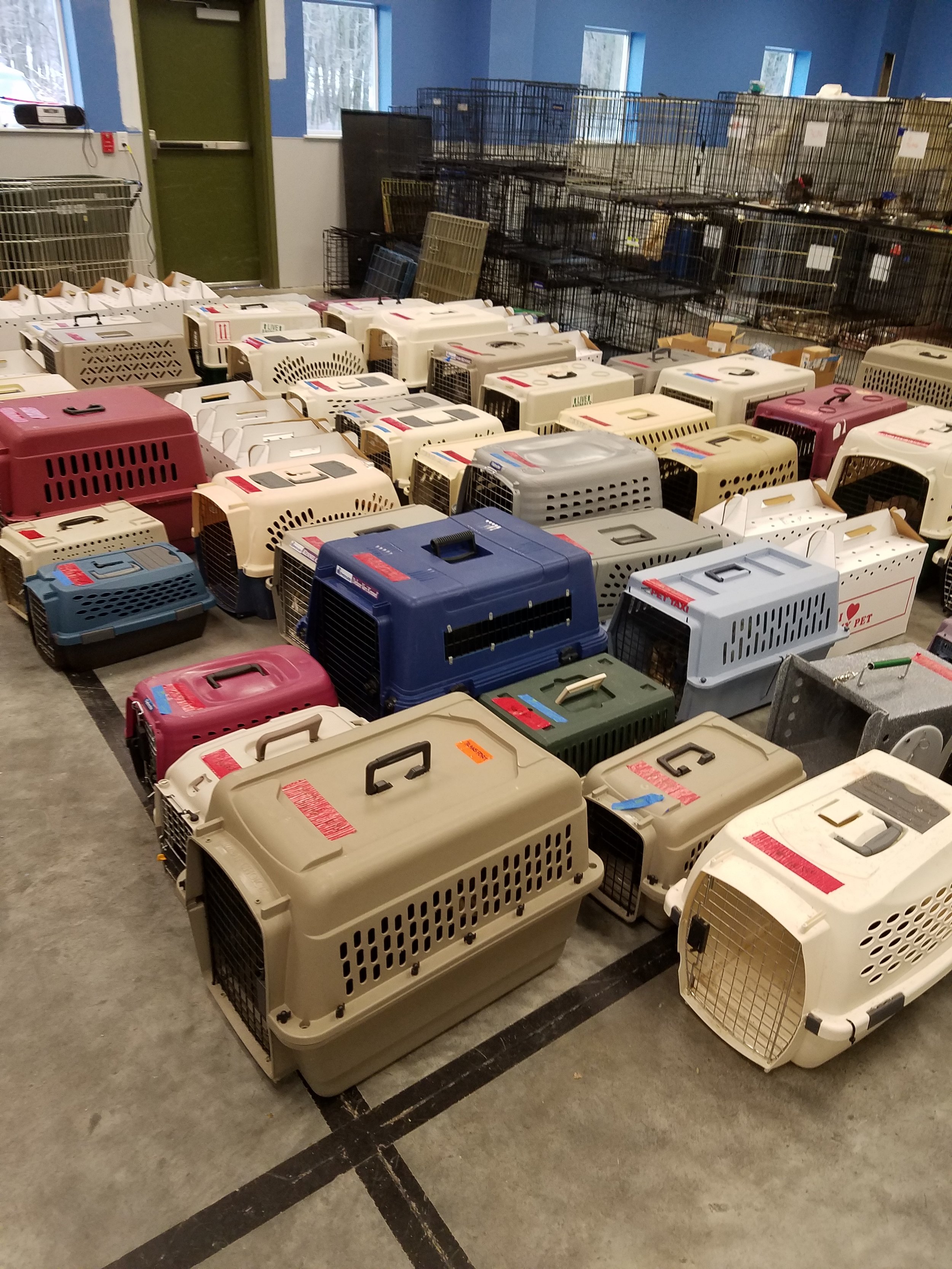
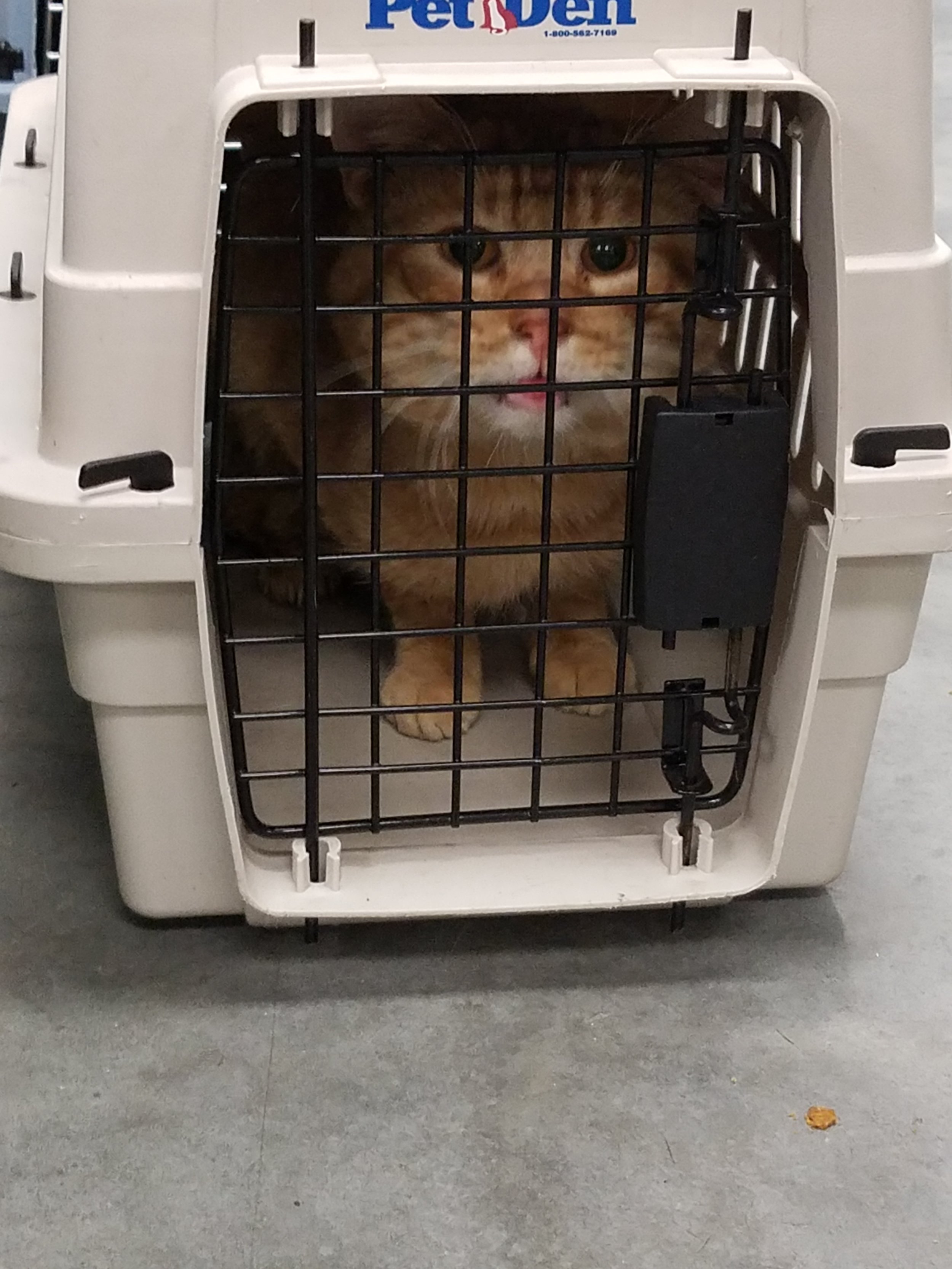
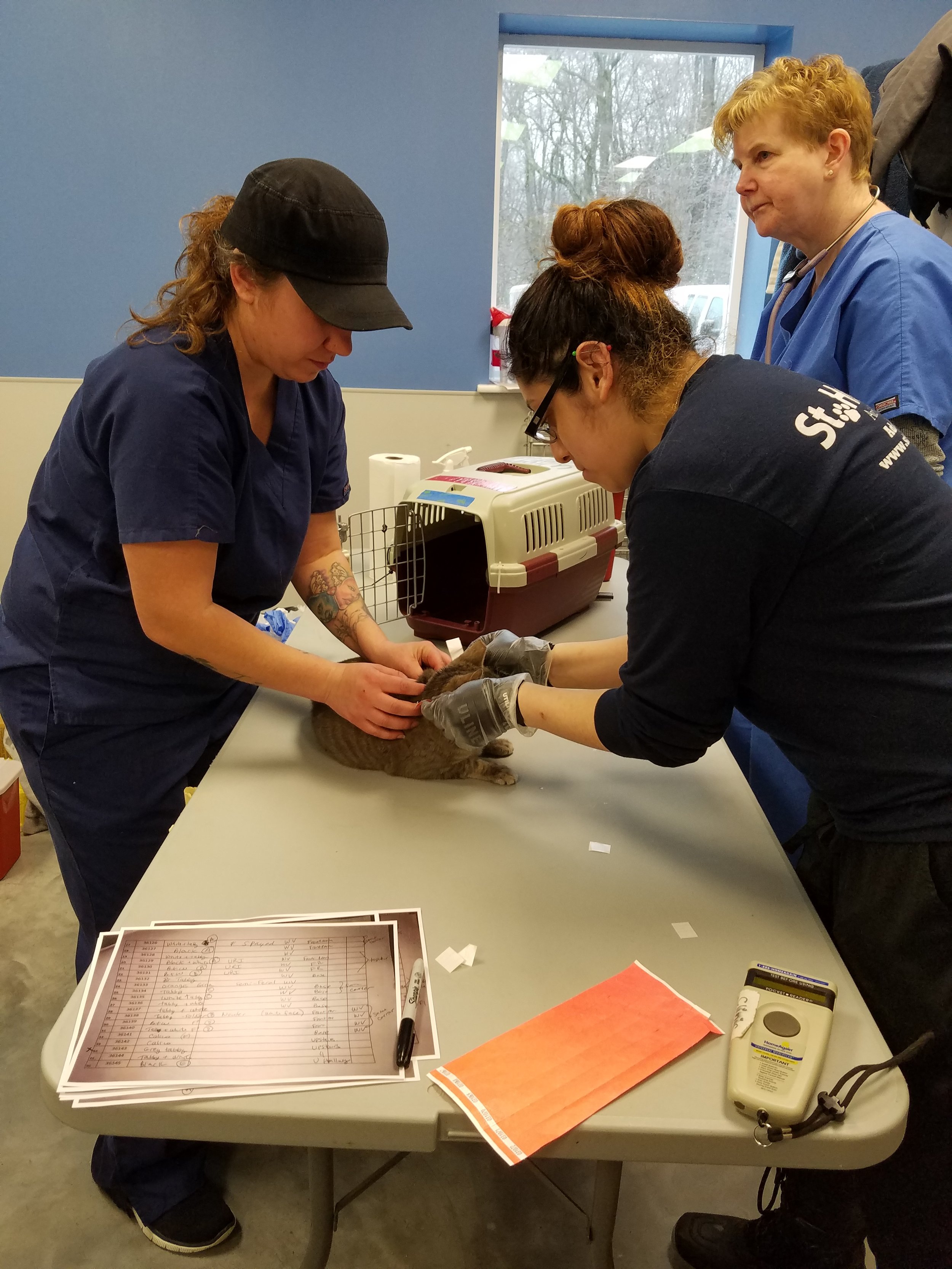
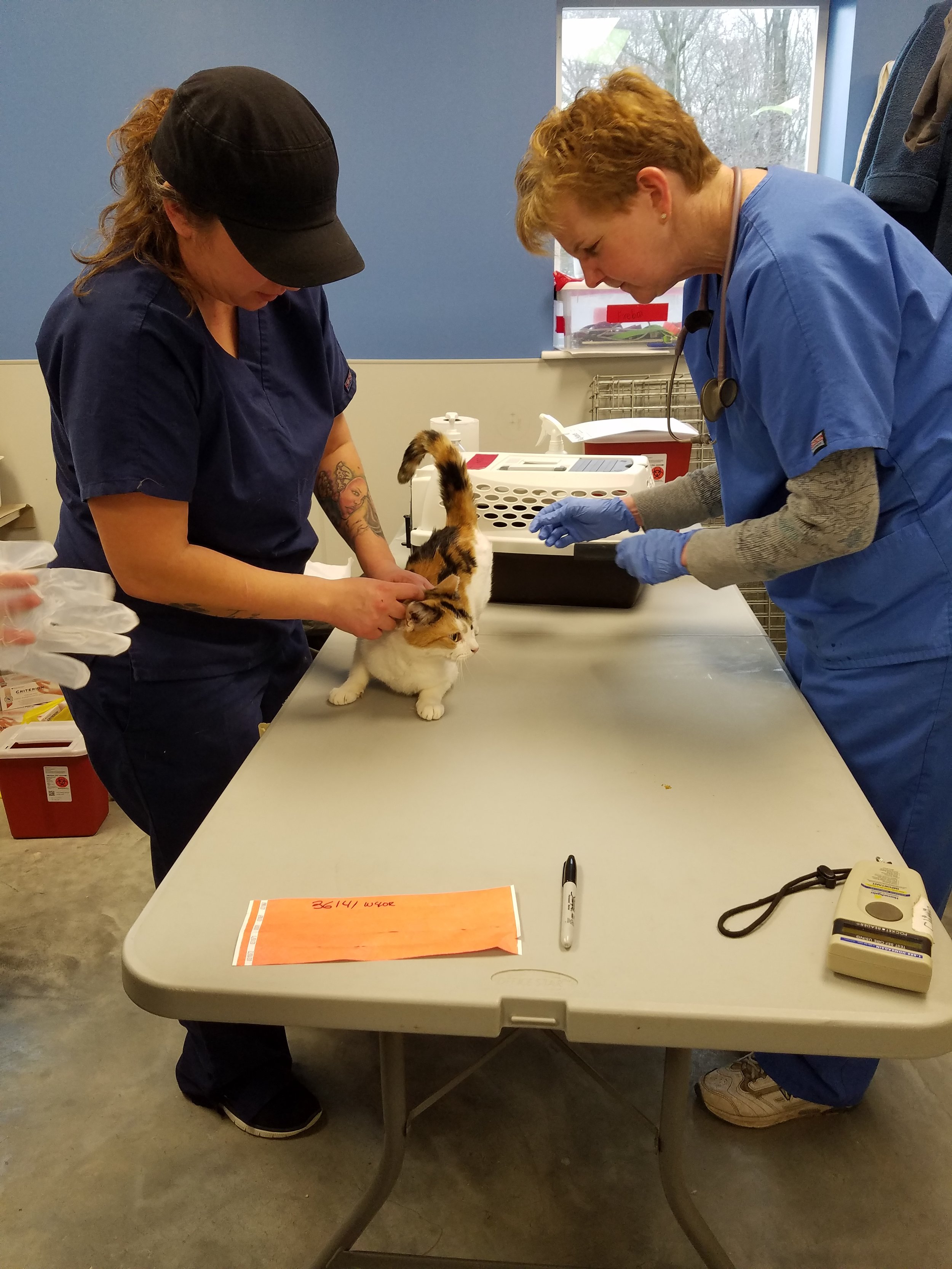
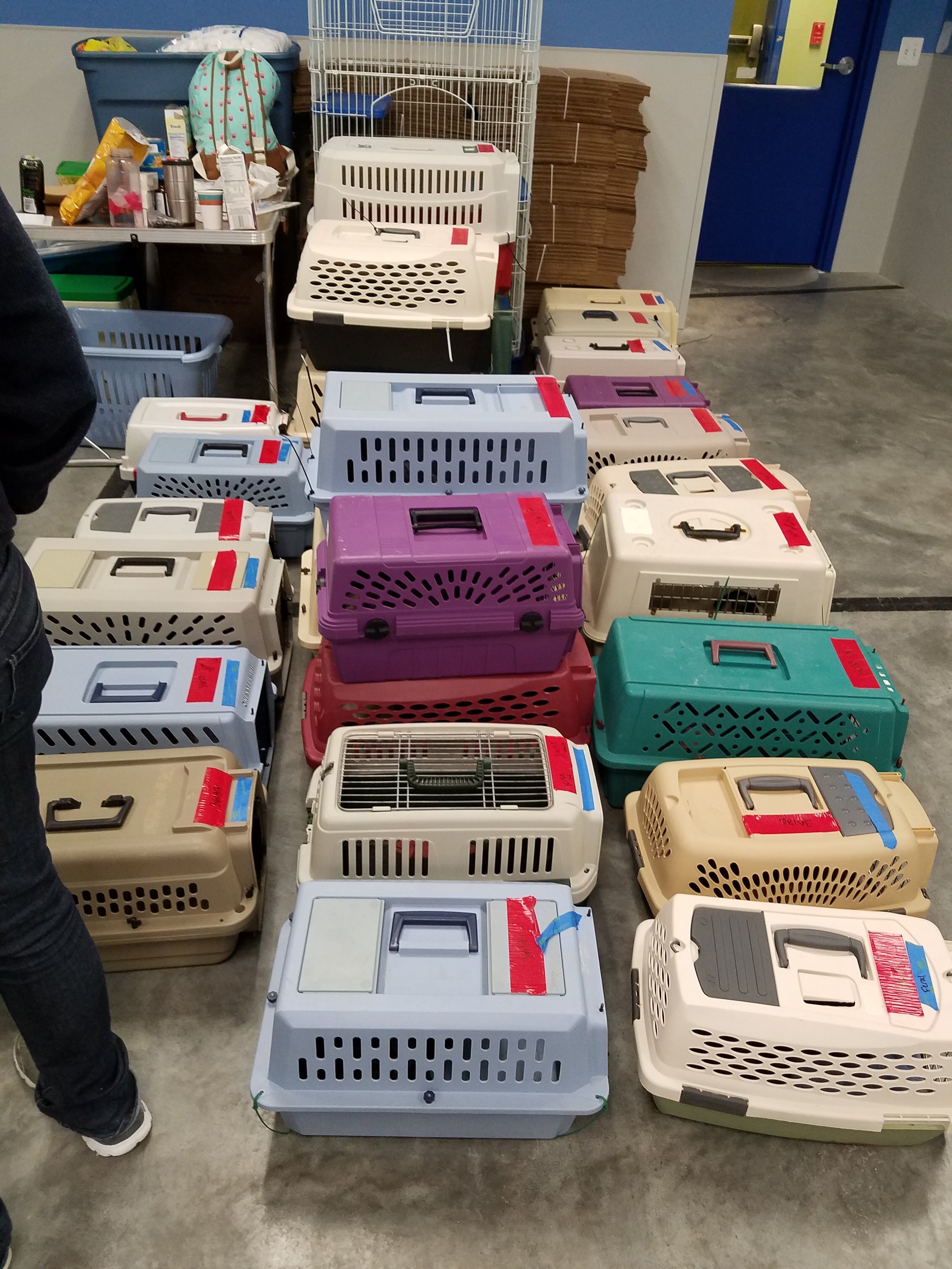
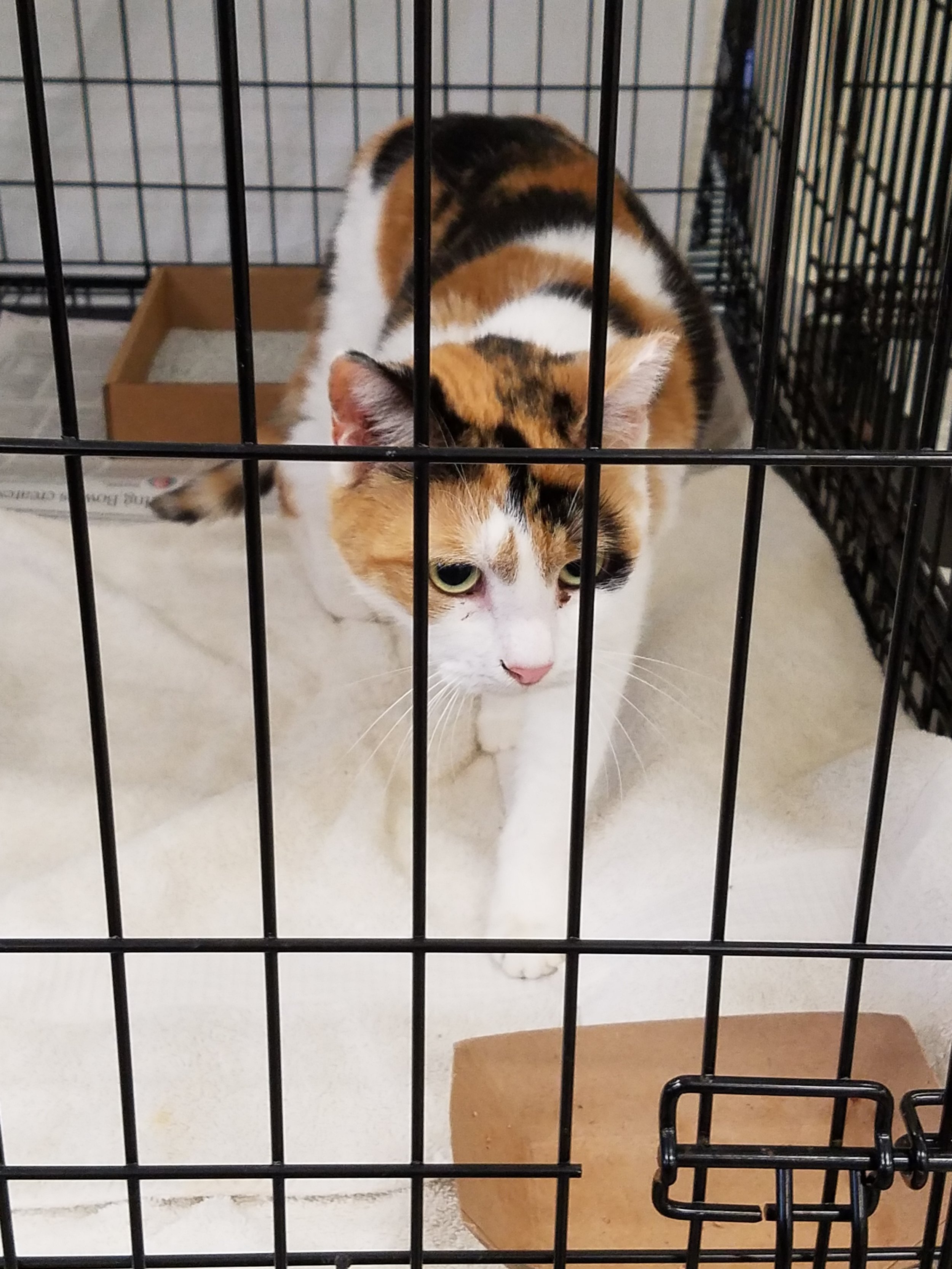
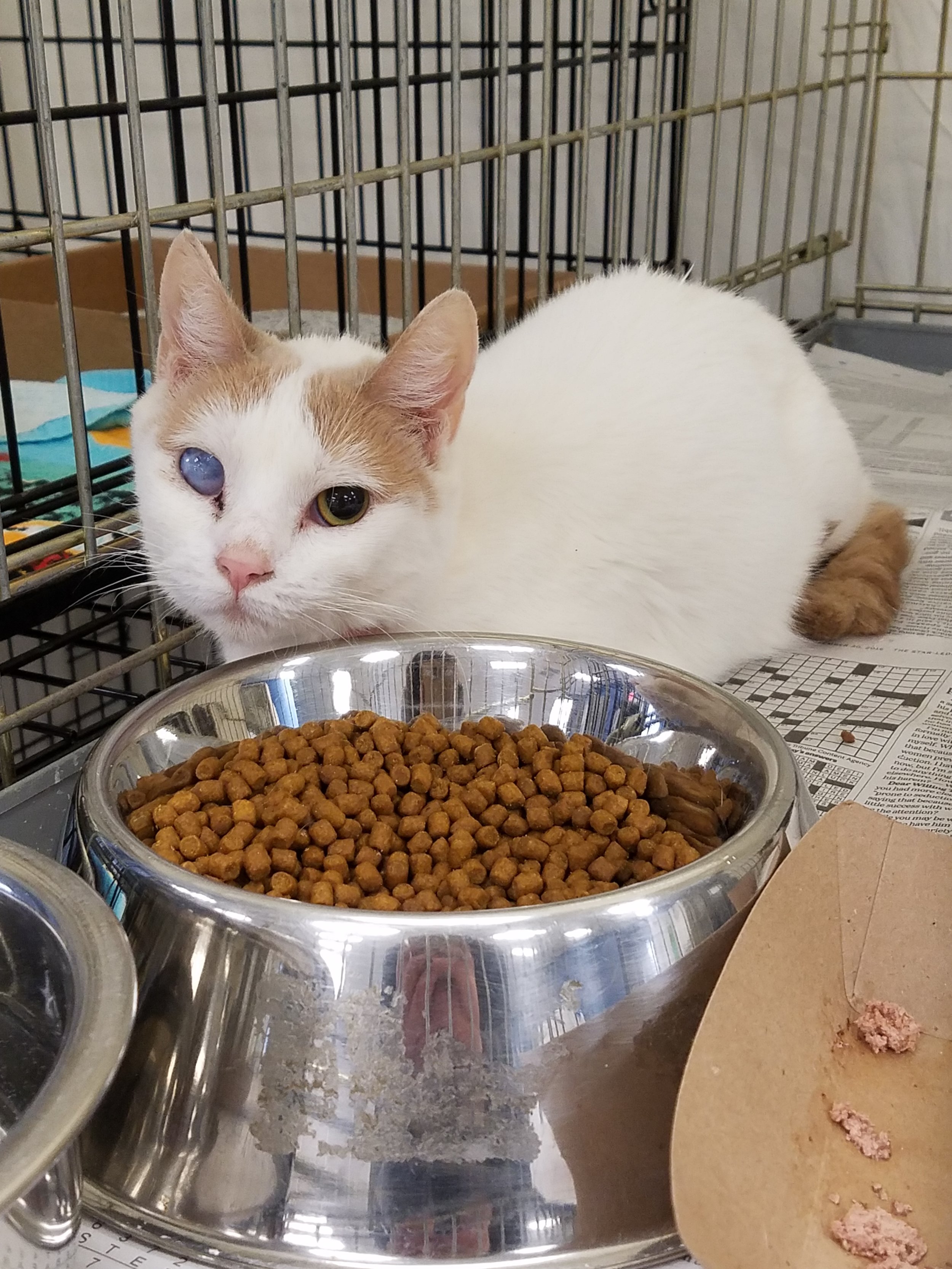
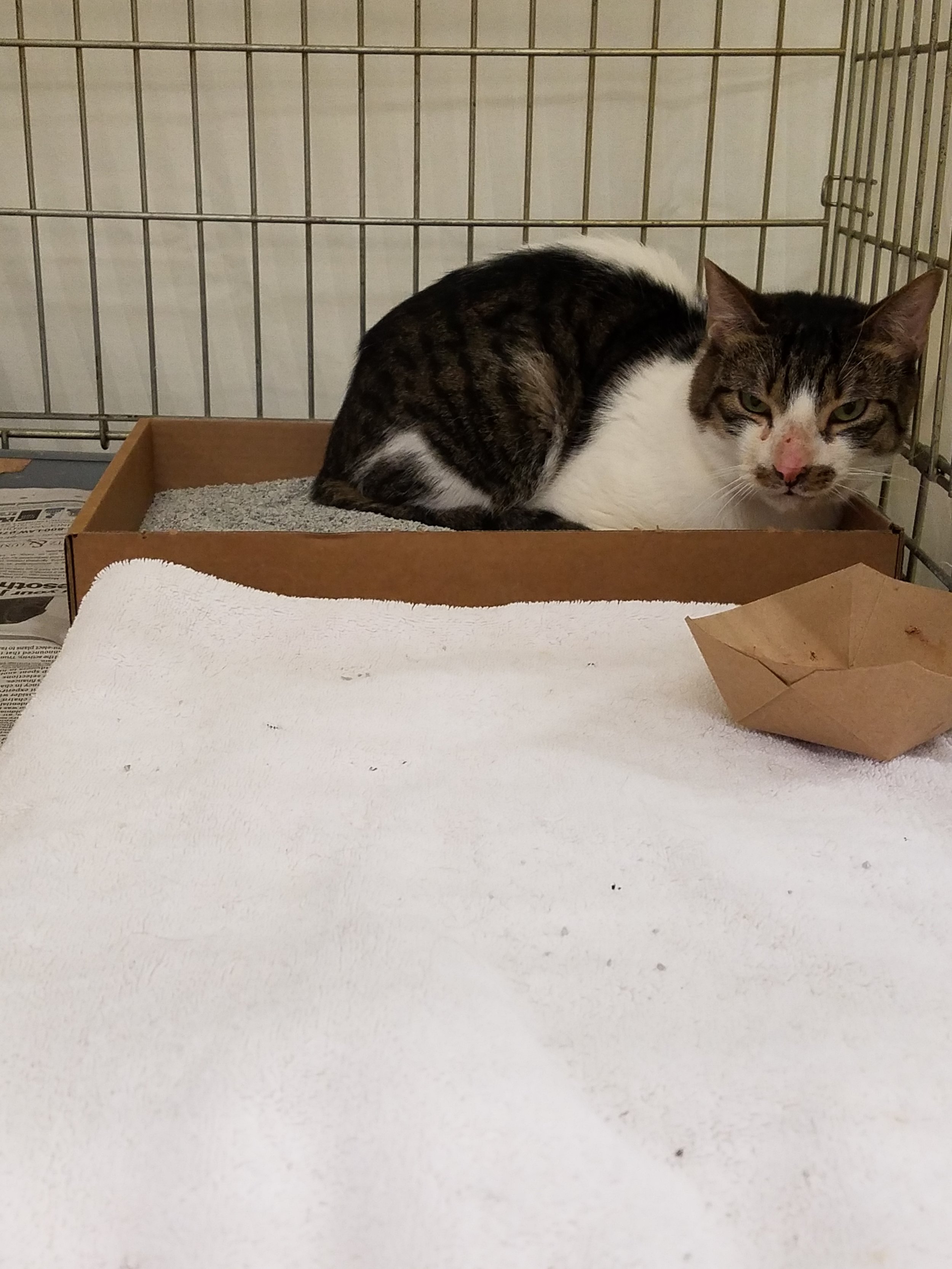
(February 13, 2017) Madison, NJ, A call for supplies and adoptions follows the intake of over 130 cats from an overwhelmed animal rescue in northern New Jersey on Sunday, February 12th.
People for Animals and St. Hubert’s worked together to remove the cats in icy storm conditions and bring them to St. Hubert’s Madison campus for immediate triage, vaccinations and care.
“We were asked to assist the rescue who does good work in the community but had simply gotten overrun,” said Jane Guillaume, Executive Director of People for Animals. “We could not have responded at this level without our friends at St. Hubert’s.” she added.
Guillaume had contacted St. Hubert’s on Friday morning requesting assistance.
A team of combined staff removed the cats from the property and provided initial care at St. Hubert’s. Although some of the cats had vaccines, records were unavailable and citing health and well-being, the groups provided about a hundred cats vaccinations upon arrival at St. Hubert’s and were examined by Dr. Laurie Heeb, a veterinarian onsite from People for Animals and two veterinary technicians, Valerie Wilson and Jennifer Gomez, from People for Animals and St. Hubert’s, respectively. The remainder of the cats will receive vaccinations and veterinary exams on Monday and Tuesday.
“We appreciate People for Animals reaching out to us and the rescue group whose founder and volunteers were eager to see these cats get the care and help they needed,” said Heather Cammisa, President/CEO of St. Hubert’s. “The importance of productive relationships in animal rescue cannot be overstated, in these situations or in the daily work to advance animal welfare,” Cammisa added.
All cats are currently resting and adjusting to their new environment while being observed for health before being placed for adoption. The most common ailment noted by St. Hubert’s so far is upper respiratory infection while some cats are being tested for skin conditions. After triage, People for Animals transported 50 cats to their program. The 83 remaining cats will stay at St. Hubert’s for the foreseeable future until health conditions have been cleared.
St. Hubert’s and People for Animals are both in need of monetary donations as well as supplies to care for these cats as they await adoption. The public can immediately help by donating canned cat food, clean towels, plastic scrub brushes, wire ties, washable cat toys, and white copy paper. Both groups also seek anyone thinking of adopting a cat to visit their adoption locations so there is more adoption housing space for these cats. Volunteers have been called in by both agencies to help care for the cats while they recover or are being prepared for placement. St Hubert’s Animal Welfare Center is open seven days a week for adoptions and donation drop offs. To learn more or make a donation, please contact St. Hubert’s, 973.377.7094, www.sthuberts.org, and People for Animals, 973.282.0890, www.pfaonline.org.
ABOUT ST. HUBERT'S ANIMAL WELFARE CENTER Founded in 1939, St. Hubert’s Animal Welfare Center is a nonprofit organization dedicated to the humane treatment of animals. Its services to the community include pet adoption and animal rescue, humane education, a pet helpline, pet training, professional education, animal-assisted therapy, and pet loss support. St. Hubert’s Animal Welfare Center has shelters in Madison, North Branch, and Ledgewood, NJ, a dog training school in Madison, and a PetSmart Charities Everyday Adoption Center at the PetSmart in Mt. Olive. For more information about St. Hubert’s, visit www.sthuberts.org or contact the Madison shelter at (973) 377-2295, the North Branch shelter at (908) 526-3330, the Ledgewood shelter at (973) 347-5469, or the Everyday Adoption Center at (973) 448-7601, ext. 7.
ABOUT PEOPLE FOR ANIMALS Founded in 1980, People for Animals, Inc. is an independent nonprofit animal welfare organization not affiliated with any other Humane Society or any national or local animal welfare groups. They were chosen by the State of New Jersey to participate in a pilot program to reduce animal overpopulation, and in 1985, opened the first Low Cost Spay/Neuter Clinic of its kind in this State. People for Animals relies entirely upon private donations, grants, bequests and fund raising events to care for more than 22,000 animals the organization provides services for each year. People for Animals has three locations; Hillside NJ, Clayton NJ, and Robbinsville NJ.
Enrichment Program Provides Healing for At-Risk Youth Through Shelter Dog Training
Chef Stefan Davenport teaching our students the ways of vegan cooking
On Friday, January 27, 2017, St. Hubert’s Animal Welfare Center celebrated the graduation of its 4th Annual Teen Animal Welfare Enrichment Program. The program allows at-risk teens to work in pairs, using teamwork to train St. Hubert’s shelter dogs in commands and behavior modification. The program participants have all struggled through traumatic experiences resulting in substance abuse and behavioral issues. The 5-day intensive is designed to teach lessons that inspire empathy, compassion, respect, and responsibility while strengthening the human-animal bond and giving the participants a sense of accomplishment. During the graduation day, family and community members were invited to St. Hubert’s Training and Behavior Center on the Madison Campus where the students demonstrated their dog’s learned commands. Many of St. Hubert’s shelter dogs have also come from difficult pasts. St. Hubert’s provides the unique opportunity for a special bond to grow between each Daytop teen and their furry student. In addition to the daily training courses, the students also participated in group discussions with guest clinicians providing education on animal welfare issues such as factory farming, respect for wild-life, and therapy. The participants even had a cooking lesson with a vegan chef.
“We have a wonderful Humane Education program, but really wanted to dive-in to where we thought a greater impact was needed,” said Heather Cammisa, President & CEO. We began this program in 2014 to really provide a way for at-risk youth to feel a sense of accomplishment and the power of the human-animal bond.”
Overall, St. Hubert’s Humane Education offerings, which include school, scout, and summer day camp programs, reached more than 4,000 students this past year, with many of them coming from underserved communities. They are pleased to partner with Daytop NJ, a residential and out-patient facility for adolescents struggling with substance abuse and behavioral issues, to help transform these teens into compassionate, motivated, adults.
St. Hubert's Sister Shelter Partners Words of Gratitude
Our Waystation program grew substantially in 2016, allowing St. Hubert's Animal Welfare Center to meet and work with so many dedicated animal welfare individuals and organizations throughout New Jersey and the United States, all with the shared goals of trying to save lives and find more homes for adoptable pets. And together we did save lives, we welcomed over 6000 animals in our care in 2016. This is just the beginning, St. Hubert’s continues to connect with regional shelters and share best practices while planning how to expand on our life saving work today, tomorrow and for the future of animal welfare.
What makes St. Hubert's Transport/Waystation so unique is our partnerships represent a relationship beyond the simple transfer of animals and includes opportunities for information sharing, and the distribution of funds to support spaying and neutering of public or free roaming animals in the source community. St. Hubert’s is changing the way shelters interact with each other and promoting teamwork. We believe in promoting best practices, and educational resources in order to enhance our joint efforts and heighten the sense of community goodwill within the animal sheltering profession, while helping more and more animals.
Each Source Partner Shelter, which is the shelter we receive the adoptable pet, is given $25.00 per animal by participating in the program. For many small rural shelters, the benefits of participating in the St. Hubert's program is multi-faceted, the funds are directly used to increase spaying and neutering of community pets, while allowing the adoptable pets at the shelter to quickly move to another part of the country where there is a greater chance for them to find homes. Many of the smaller shelters have limited resources, so to contemplate funding a needed community spay and neuter program is beyond the realm of possibilities.As an example, one of our regional sister shelter source partners exists on an annual budget of $26,000. By working together, things become possible.
The Sister Shelter staff also benefits through shared resources and educational opportunities, which helps to increase employee morale and management efficiency. At times, it is often enough for the Shelter Staff to be able to speak to other Animal Welfare Professionals and know they are not alone in their work and dedication to saving animals.
St. Hubert's also works very closely with numerous destination partner Shelters. These partners are at the other end of the process and receive just as much attention from our St. Hubert's team in making sure they have room for adoptable animals and adhere to the Waystation program quality standards. St. Hubert’s takes its role as guardian to these transported animals very seriously. Animals are altered and evaluated before they go out to be adopted. The program impact goes far beyond saving lives.
Here are some quotes from our Sister shelters and Destination shelters. St. Hubert's is redefining how an animal welfare organization functions and give back- not only do the animals win, but so does the animal shelter community.
The positive ripple effect is contagious.
Look for more information and developments as 2017 progresses!
“Anderson County PAWS is so happy to report that due to your giveback program we have been able to implement a “Spay or Pay” program for dogs. So far we have altered 23 dogs! We can’t thank St. Hubert’s enough for being a partner and helping us give back to the animals in our community!
Kim Sanders, PAWS
”
Community Outreach Programs Help Thousands of Humans and Pets
St. Hubert’s Animal Welfare Center now welcomes over 5000 pets into our care each year, but our outreach extends to humans in need as well. Our community outreach programs are focused on helping both pets and people in Northern and Central New Jersey. We are proud to have reached thousands of individuals in 2016, and we’re excited to share updates on our 2016 programs below—as well as our plans for 2017.
Our Food Bank program for pet parents in need has experienced significant growth in 2016. With 2016 program support from M&T Bank and the Church & Dwight Employee Giving Fund, we work with ten human services organizations in New Jersey to distribute pet food and supplies on a regular, ongoing basis to families experiencing financial hardship, and provide support services as needed. We are on track to provide well over 60,000 pet meals to families in need in New Jersey this year—feeding over 183 pets all their meals each day. And we go beyond just food and supplies—we also help clients spay and neuter their pets and receive low-cost medical services. We are committed to meeting the needs of pet parents in our communities in order to keep families together with the pets they love—that’s why we’re looking to further expand this program in 2017 by adding new organizations to our list of partners and deepening our outreach to senior citizen pet parents.
Our 2016 organizational partnerships extend to local domestic abuse organizations, whom we partner with to provide emergency housing for the pets of those fleeing domestic violence. Through our TLCC program (Temporary Loving Critter Care), we help victims leave abusive relationships while ensuring that their animal family members are safe. Statistics show that between 25 and 40 percent of victims with pets remain in unsafe situations due to reluctance about leaving them behind. Through this program, we provide free emergency sheltering through comforting foster care or in-shelter care for all types of pets and enable visitation opportunities with their guardians until they can be reunited.
In 2015, St. Hubert’s launched a new program to provide vaccine clinics in underserved areas in Northern and Central New Jersey; we found that 67% of the pets at our first vaccine clinic were unaltered, and many had never seen a veterinarian before. To better meet this need, we held five vaccine clinics in 2016 in targeted areas in Somerville, Morristown, Roxbury, Maplewood, and Dover, NJ. These clinics, made possible through 2016 support from the Head Family Charitable Foundation, provided free vaccines to those for whom even low-cost options were unaffordable or inaccessible. Across these clinics, 39% had never seen a veterinarian before, and nearly half, 47%, were unaltered. We offered assistance with untreated medical issues, and provided free spay/neuter services for unaltered pets – with great success – 74% of unaltered pets in attendance are now spayed and neutered, showing that there was not an ideological opposition, but rather a lack of accessible care. These clinics are helping pets stay healthy, and enabling pet parents in underserved areas in our communities to receive the support services they need. We are committed to providing future clinics to reach those in need, and providing ongoing support to those who attend our clinics; a new position has been created here at St. Hubert’s—thanks to funding from the Fournier Family Foundation--to help meet the needs of pet parents in underserved communities. Our new Community Care Manager, Jenn Gregory, is already making plans to further expand our community outreach, including organizing winter/spring 2017 vaccine clinics in Newark, South Orange, and East Orange, NJ.
In 2016, our free pet helpline, supported in part through funding from the Head Family Charitable Foundation, has received an average of 50 new cases per month. This service provides assistance for those seeking resources such as low-cost veterinary care and pet-friendly housing information, as well as those seeking help resolving pet behavior issues or searching for lost pets. This year, our pet helpline staff has updated the St. Hubert’s website with online resources to expand our reach, and to make it easy to reach out, our staff is reachable by phone, email, and through our Pet Retention Facebook page. In 2016, our helpline staff has noted an increase in calls reporting found pets, likely a result of our staff developing relationships with many volunteer run county and statewide lost and found groups. Our helpline’s 2016 successes include reuniting lost pets with their families, successfully resolving behavior issues, and providing ongoing encouragement and support to pet parents in our communities.
2016 has been a year of growth and success for St. Hubert’s community outreach programs, and we’re looking forward to continuing and building on this important work in 2017. We are committed to being a resource for our communities—identifying and responding to the needs ofunderserved and at-risk populations and making a difference in the lives of both people and pets in New Jersey. Continue to check our news for more information about our community programs.
Visit the Newly Re-Opened St. Hubert's Noah's Ark Campus.
St. Hubert's Animal Welfare Center Noah's Ark Campus celebrated its grand re-opening on Sunday, November 6, with an Open House Community Day. The adoptable animals were settled in, and were ready to meet the community. Many people, both old supporters of Noah's, as well as new neighbors came by and commented on how beautiful the renovated facilities are.
The Zephyr, our new custom designed animal transport vehicle was at the Noah's Ark Campus, so the public could tour the largest vehicle of the Waystation transport initiative and learn about the life saving program. The Zephyr allows us to partner with many U.S. shelters through short and long-distance transfers, and relocate adoptable pets to areas where they have a greater chance to find homes. Besides the transport program, St. Hubert's has been very active right here in New Jersey; with educational programs, and numerous community outreach services.
The Noah's Ark Campus transformation is a testament to how community support, hard work and your donations can create real change. The Campus is now a shelter serving the people and pets in western Morris, Sussex, and Warren counties. The re-opening has been a great success with all our dogs finding new homes in the first week and many small pocket pets and cats also finding new families to love.
The facilities are as beautiful and functional inside and out. The past structural issues have been corrected, new flooring has been installed, the plumbing has been upgraded, and the electrical system is now up to code. The new optimal HVAC system will keep the animals comfortable throughout the year. The kennels have been enlarged and the animals have a more pleasant outdoor area to play in. Potential Pet Parents will enjoy meeting their new best friend, in one of our two new Meet and Greet rooms. Our experienced staff will evaluate the animals in our new exam and treatment room.
Everything is completely refurbished and up to standards and building codes, we certainly hope you will come and visit, even if its just to see the renovations and to say hello. If you are not in the area, or just cannot visit, we have posted a short virtual tour on our Noah's Ark web page. St. Hubert's Noah's Ark continues to be a special community spot in Ledgewood, New Jersey.
We look forward to sharing our new home with the community in the upcoming weeks and years ahead. Consider continuing your St. Hubert's Noah's Ark Campus commitment by volunteering, or by making a donation during this very important first year of service. The animals will be very grateful for your contributions.
St. Hubert's Noah's Ark Campus is located at 1915 Route 46, Ledgewood, NJ 07852
Additional parking will be available for Sunday, November 6th at the Health Pavilion, 1911 Route 46, Ledgewood, NJ 07852
Please consider making a donation to the St. Hubert's Noah's Ark Campus Launch Fund. Proceeds from the Launch Fund will go directly to cover the Noah's Ark Campus first year of ongoing daily expenses.
For any additional information, call Marianne Bosshart, VP Communications and Development at 973-377-7094, ext. 242



